2019 Emerging Leaders Profiles
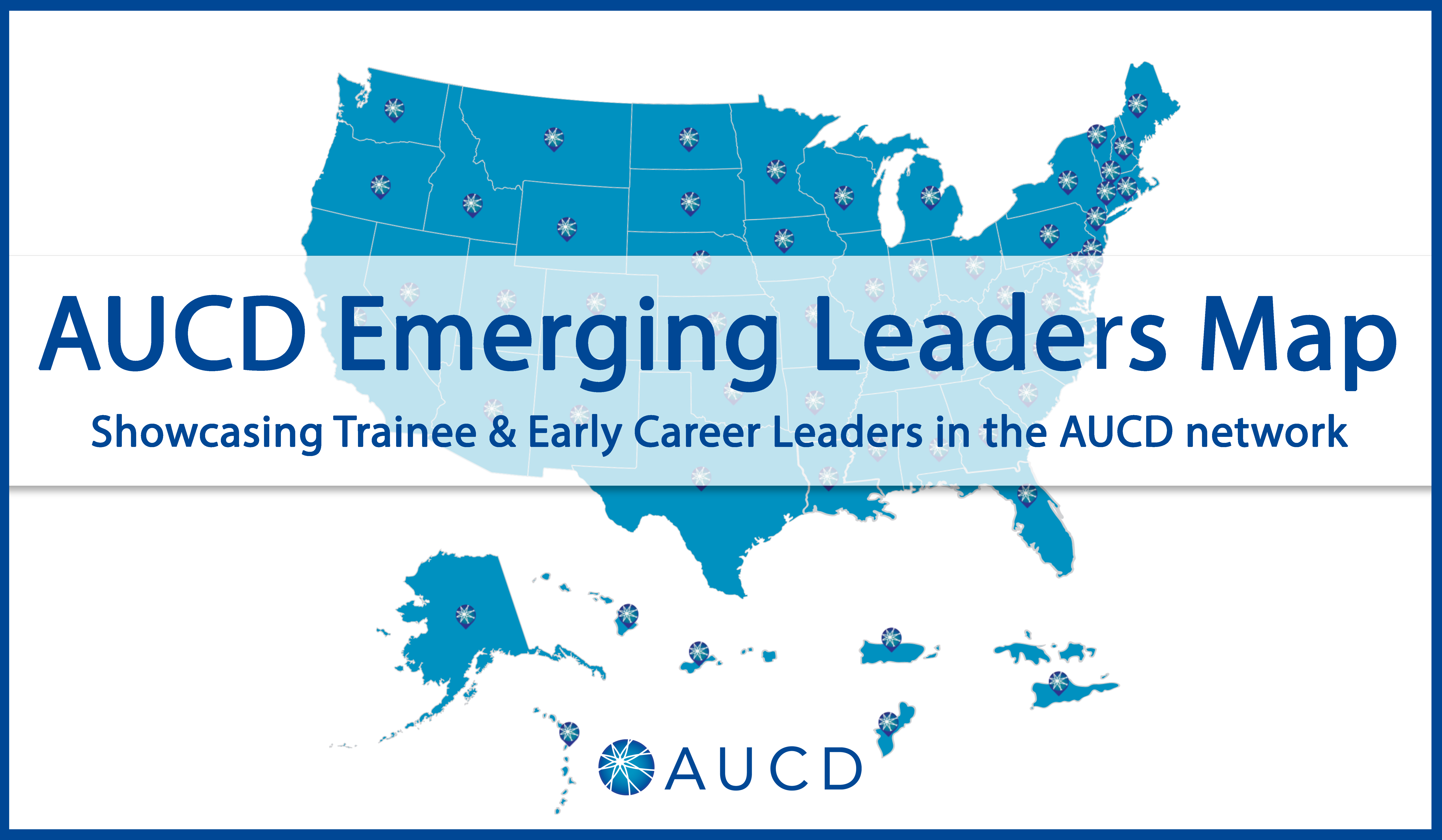
The AUCD Emerging Leaders Map highlights the contributions of diverse trainees across AUCD's network. The theme of this year’s map is “Centering People with Disabilities/Disabled People.” “Centering” means that PWD/DP are at the core of our work. It requires actively listening to and respecting people with disabilities/disabled people and their needs and wants within our communities. Each person was selected for inclusion on the map based on their contributions to the network, how they have demonstrated leadership, and their values and commitment to diversity, inclusion, and respect for others. You can click the pins in each state to learn about the different programs and centers, as well as the activities that trainees are involved in. The Emerging Leaders Map is a great way to explore ongoing activities in the network, to brainstorm ideas for your program or center, and to use as a networking resource for future opportunities!
To be highlighted on the 2020 Spring Map, please watch for the nomination survey in Fall 2019. Questions about the AUCD Emerging Leaders Map should be directed to AUCD's Mollie Blafer.
AR: Partners for Inclusive Communities,
Elizabeth Cleveland
AZ: Sonoran UCEDD,
Graciela Zonnie Olivas
CT: University of Connecticuit A. J. Pappanikou Center for Developmental Disabilities,
Tom Cosker
FL: Florida Center for Inclusive Communities,
Angela Makris
FL: Mailman Center for Child Development (UCEDD),
Jennifer Chavez
GA: Center for Leadership in Disability at GSU,
Tim Beighley
ID: Center on Disabilities and Human Development,
Mia Giglio
ID: Center on Disabilities and Human Development,
Eric Desmarais
IL: Institute on Disability & Human Development (UCEDD),
Helen Rottier
IL: Institute on Disability & Human Development (LEND),
Hena Thakur
KS: Schiefelbusch Institute for Life Span Studies,
Sarah Girresch-Ward
MD: Kennedy Krieger Institute (LEND),
Eve Kronzek
MD: Kennedy Krieger Institute (UCEDD),
Da-Yea Song
MN: Institute on Community Integration (LEND),
Suad Salad
MN: Institute on Community Integration (UCEDD),
Macdonald Metzger
NY, Strong Center for Developmental Disabilities,
Jacqueline McGinley
OH: The Nisonger Center,
Jessica Prokup
OH: University of Cincinnati UCE,
Jade Clark
PA: Institute on Disabilities,
Sarah Mueller
TX: Center on Disability and Development,
Yi-Fan Li
TX: Texas Center for Disability Studies,
Nichole Wines-Yanez
VA: Parntership for People with Disabilities,
Moshe Levi
WA: Center on Human Development & Disabilities,
John Lemus
Elizabeth Cleveland
Discipline: Speech Language Pathology
Partners for Inclusive Communities, UCEDD/LEND (AR)
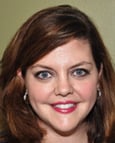 Elizabeth Cleveland is a Speech-Language Pathologist in Arkansas. She is in the PhD consortium program for Communicative Disorders at the University of Arkansas for Medical Sciences, the University of Arkansas at Little Rock, and the University of Central Arkansas. Her major area of interest and research is Child Language Developmental and Disorders, while her minor area is Multicultural Issues. She is a second year SLP LEND trainee. Elizabeth’s experience with the Arkansas LEND has allowed her to be one of the leading experts in the state on Fetal Alcohol Spectrum Disorders (FASD) and a speech-language pathologist’s role in the treatment of children with FASD. She enjoys presenting on this topic at the local and state levels to various groups of clinicians and other professionals. Elizabeth enjoys spending her free time with her son (6), daughter (2), and her husband. She also loves travelling with them. Elizabeth is a Speech-Language Pathologist studying to get a PhD in Child Language Development and Disorders. The Arkansas LEND program meets at the University of Arkansas for Medical Sciences, but has an affiliation with Partners for Inclusive Communities, which is Arkansas’s UCEDD.
Elizabeth Cleveland is a Speech-Language Pathologist in Arkansas. She is in the PhD consortium program for Communicative Disorders at the University of Arkansas for Medical Sciences, the University of Arkansas at Little Rock, and the University of Central Arkansas. Her major area of interest and research is Child Language Developmental and Disorders, while her minor area is Multicultural Issues. She is a second year SLP LEND trainee. Elizabeth’s experience with the Arkansas LEND has allowed her to be one of the leading experts in the state on Fetal Alcohol Spectrum Disorders (FASD) and a speech-language pathologist’s role in the treatment of children with FASD. She enjoys presenting on this topic at the local and state levels to various groups of clinicians and other professionals. Elizabeth enjoys spending her free time with her son (6), daughter (2), and her husband. She also loves travelling with them. Elizabeth is a Speech-Language Pathologist studying to get a PhD in Child Language Development and Disorders. The Arkansas LEND program meets at the University of Arkansas for Medical Sciences, but has an affiliation with Partners for Inclusive Communities, which is Arkansas’s UCEDD.
Image Description: Elizabeth is a Caucasian woman with shoulder-length brown hair and blue eyes. She is wearing silver earrings, a blue shirt and she is smiling.
1. How does the work you do center disabled people/people with disabilities?
Elizabeth is a pediatric speech-language pathologist. Her work is focused on the treatment of young children, especially children aged birth to five years. Elizabeth supervises graduate students in the UAMS Master’s program, and in doing so, is able to teach the students how to empower both the children with disabilities and disorders and their caregivers. She encourages her students to educate and advocate for their clients and their client’s families. By teaching her students these skills, she is able to reach a greater number of families of children with various abilities. Elizabeth also educates and advocates to communities in Arkansas on various disorders, including Fetal Alcohol Spectrum Disorders, in order to create a community of understanding and empowerment for people with lived experiences.
2. How has your AUCD traineeship made you a better ally or self-advocate?
During her AUCD traineeship, Elizabeth has learned to be a better ally by studying policies and procedures that affect people with disabilities, both at the state and national levels. She has also learned that educating the community can be influential in helping the community members understand and support people with lived experiences. Along with becoming a better ally, Elizabeth’s AUCD traineeship has allowed her to become a better parent advocate for her 6 year old son. She is able to educate school personnel and administration on her son’s disability so that he can be successful. She has learned how to fight for her son while demonstrating respect. Elizabeth has learned from the best professionals in the state. But the most influential teachers in her AUCD traineeship have been the self-advocates in her program. Her friends who are self-advocates have helped her to be a better friend, ally, and advocate, and in turn a better speech-language pathologist.
3. What is one thing about your own ally ship or self-advocacy that you would like to improve, whether for your disability or other communities?
One area that Elizabeth wants to see improvement is her parent advocacy abilities. Her son is newly diagnosed with Attention-Deficit/Hyperactivity Disorder (ADHD) and she is at the beginning of her parent advocacy journey. She wants to teach her son to be a strong self-advocate, much like many of the people she has met during her traineeship. Arkansas has a strong team of family advocates and Elizabeth’s experience with AUCD and LEND has allowed connections with these family members. She knows there is much improvement to make, but is constantly encouraged by her LEND community.
4. What is one obstacle or barrier (local, systemic, and/or policy) that you are addressing in your discipline in partnership with disabled people/people with disabilities?
Arkansas, like many other states, has extremely rural communities and several medical deserts. This becomes an enormous obstacle when trying to provide early identification and early intervention for these communities. Arkansas LEND continues to address this concern in several different ways. AR LEND provides a multidisciplinary diagnostic team that travels a few times each semester to these medical deserts in order to diagnose or rule out an autism spectrum disorder. Another way that AR LEND assists with areas that are in need of professionals is to provide multidisciplinary Fetal Alcohol Spectrum Disorder evaluations to the community. Elizabeth is proud to be a part of both of these multidisciplinary teams and looks forward to continue serve the communities in Arkansas with the knowledge she has learned through her traineeship.
Graciela Zonnie Olivas
Discipline: Public Health
Sonoran UCEDD (AZ)
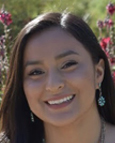
“Yá’át’ééh shí éí Graciela Olivas yinishyé. Hashk'ąą Hadzohí nishłi Naakai dine'é báshíshchíín Naakai dine'é ei dashinalí dóó Tsénjikíní ei daschicheii.”
My name is Graciela “Zonnie” Olivas. I am yucca fruit strung out in a line clan born for the Mexican people clan. My paternal grandmother's clan is the Mexican peopleclan and my maternal grandfather's clan is the cliff dwellers people clan. This is my introduction in my Navajo language and represents an important part of my cultural identity as a Native woman.”
Zonnie is from Buckeye, AZ and transferred to the University of Arizona after earning her associate degree from Estrella Mountain Community College. She is in her senior year and will soon complete her Bachelor of Science in Public Health. She aspires to then obtain a Master of Science in Environmental Health, and ultimately complete a doctoral program in epidemiology. Her goal has always been to use her public health degrees to serve Native people and improve the health and wellbeing of tribal communities.
She is a former AUCD Diversity Fellow and current undergraduate intern and trainee at the University of Arizona’s Sonoran University Center for Excellence in Developmental Disabilities (UCEDD) located in Tucson, AZ. She’s been a trainee with the UCEDD since August 2017 and is currently working on completing her public health internship. Her work focuses on the development of policy recommendations that will increase inclusion through improving the UCEDD’s cultural and linguistic competence (CLC). For example, her diversity fellowship capstone project focused on developing a tool and process to collect social identity and language data from stakeholders. This tool will be used to consistently collect and analyze demographic data to ensure SUCEDD services cater to the needs of representative populations in Arizona.
Image Description: A headshot of a person sitting outside in front of green plants with red flowers. It is sunny and bright outside. She is smiling directly at the camera with her head slightly tilted to the left. Her hair is dark brown, shoulder length, and parted to the side. She is wearing a red quarter sleeve dress and has a turquoise stone necklace and turquoise earrings on. Her ethnicity is Navajo and Mexican American with brown skin and brown eyes.
1. How does the work you do center disabled people/people with disabilities?
This work centers people with disabilities as it brings to light the unique intersecting identities of individuals with disabilities. To collect information about language, culture, and racial/ethnic background is necessary in order to address the different aspects of one’s identity and ensure the UCEDD is responsive to community needs. Having conversations about CLC policy and issues surrounding diversity and inclusion has helped us define our next steps and ensuring these ideas are reflected in center policy and procedures.
2. How has your AUCD traineeship made you a better ally or self-advocate?
Zonnie’s AUCD traineeship has made her a better ally to the disability community by providing her with knowledge and experience within the field. Prior to her traineeship, she was unfamiliar with the field of disability, therefore, being educated about disability policy and perspectives has made her more aware of how crucial it is to increase visibility of the abilities, needs, and experiences of people with disabilities. In her public health graduate education and in her career, she aims to serve people from underrepresented backgrounds as a health science researcher and public health professional.
3. What is one thing about your own ally ship or self-advocacy that you would like to improve, whether for your disability or other communities?
To improve her allyship, she is committed to continuing to evolve her knowledge & experiences within the field of disability so that she can improve perceptions, correct myths and stereotypes, and enhance quality of life/opportunities for people living with a disability.
4. What is one obstacle or barrier (local, systemic, and/or policy) that you are addressing in your discipline in partnership with disabled people/people with disabilities?
Using her public health education and career, she aims to continue to be a disability advocate by educating professionals outside of the disability field and ensure that the experience of those with disabilities is represented within research, health care, and health policy. In the context of public health, it is crucial that the lived experience of disability is heard, and public health professionals acknowledge and respond directly to the environmental determinants that impact quality of life for individuals with disability.
Tom Cosker
Discipline: Family
University of Connecticut A. J. Pappanikou Center for Developmental Disabilities (CT)
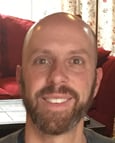 Tom is the parent of a 10-year-old boy with multiple disabilities and a 12-year-old girl without disabilities and a graduate of the Partners in Policymaking Program in 2017. He has been advocating for his son since his birth. Over the past 3 or 4 years Tom has participated in a number of parent and advocacy training sessions and has expanded his advocacy to help other youth and adults with disabilities in his home community and across CT. He joined the LEND program to further enhance his knowledge base and skills to allow him to better advocate for people with neurodevelopmental disabilities. He wants to have an impact on some of the future professionals working in the field who work with people with disabilities by shining a light on what life is like as a child with a disability and the parent of a child with a disability. He focuses his time and energy on the inclusion of people with disabilities in our communities specifically in the area of recreational opportunities.
Tom is the parent of a 10-year-old boy with multiple disabilities and a 12-year-old girl without disabilities and a graduate of the Partners in Policymaking Program in 2017. He has been advocating for his son since his birth. Over the past 3 or 4 years Tom has participated in a number of parent and advocacy training sessions and has expanded his advocacy to help other youth and adults with disabilities in his home community and across CT. He joined the LEND program to further enhance his knowledge base and skills to allow him to better advocate for people with neurodevelopmental disabilities. He wants to have an impact on some of the future professionals working in the field who work with people with disabilities by shining a light on what life is like as a child with a disability and the parent of a child with a disability. He focuses his time and energy on the inclusion of people with disabilities in our communities specifically in the area of recreational opportunities.
Image Description: Tom is the parent of a 10 year old boy with disabilities who focuses his time and energy on the inclusion of people with disabilities in our communities specifically in the area of recreational opportunities.
1. How does the work you do center disabled people/people with disabilities?
Tom’s work on inclusion of PWD in his community always comes back to how his work benefits his son and the many other youth in his community with disabilities. As the leader of parent groups and student groups, Tom focuses his efforts on the opportunities for inclusion that the kids and parents are looking for. Working with parents and kids combined with his work with educators, recreation staff and directors, among others has shown to be effective at keeping PWD at the center of his work. He is working to create more opportunities for PWD to be included in our community on their terms based on what they want from these programs and activities.
2. How has your AUCD traineeship made you a better ally or self-advocate?
The AUCD traineeship has been an amazing and eye opening experience for Tom in many ways as he works with people in his community. The multi and transdisciplinary approach he learned about has changed the way he thinks and how he approaches his work on inclusion. His focus on bringing many community members, most especially PWD, together to have conversations and effect change in a positive way has come directly from his learning in the LEND program. He has seen that advocating for PWD must first include PWD themselves as well as the many community members they interact with, working as a team, on a daily basis.
3. What is one thing about your own ally ship or self-advocacy that you would like to improve, whether for your disability or other communities?
As Tom moves forward in his advocacy work he is improving the voice of PWD in the decisions being made around inclusion in their community. As a member of a variety of boards and organizations in his community, he aims to increase the inclusion of PWD in determining what is needed and desired in all aspects of community life. He hopes to connect with PWD in his community and bring them to the table to improve their lives as full members of society. His ability to partner with PWD in the broader community to help them become more fully included is critical to him.
4. What is one obstacle or barrier (local, systemic, and/or policy) that you are addressing in your discipline in partnership with disabled people/people with disabilities?
Tom sees the biggest challenge in his pursuit of inclusion to be the attitudes and mindsets of the public toward PWD and their ability to contribute. The all too common attitude of helping PWD and doing things for PWD is pervasive and in need of change. He sees a strong connection between the attitudes of people without disabilities and the opportunities for inclusion afforded to PWD. Bringing PWD into the conversation and decision making processes in our communities can have a big impact on their inclusion. However, persistent work is required to bring about this change in attitude and move toward a truly inclusive community.
Jennifer Chavez
Discipline: Public Health
Mailman Center for Child Development UCEDD at the University of Miami's Miller School of Medicine (FL)
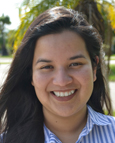 Jennifer is a consultant for the Mailman Center of Child Development and a co-facilitator for two of their leadership programs; Project Self Advocate Leadership Training (Project SALT), and the newest addition, the Student Emerging Leaders Program (SELP). Jennifer earned her BS in Microbiology and Immunology and is a recent graduate of the Public Health Sciences master’s program at the University of Miami’s Miller School of Medicine. Jennifer is also a research associate in the Epidemiology & Population Health Science division. As the first in her family to pursue higher education, Jennifer is extremely passionate about advocating for accessible and inclusive education for people with and without disabilities. When she isn’t melting in the Florida sun, Jennifer loves spending time watching competitive cooking shows with her mom, sister and best friend. The most challenging of her responsibilities, however, is being a personal assistant to her demanding, 5-year old English bulldog, Mia.
Jennifer is a consultant for the Mailman Center of Child Development and a co-facilitator for two of their leadership programs; Project Self Advocate Leadership Training (Project SALT), and the newest addition, the Student Emerging Leaders Program (SELP). Jennifer earned her BS in Microbiology and Immunology and is a recent graduate of the Public Health Sciences master’s program at the University of Miami’s Miller School of Medicine. Jennifer is also a research associate in the Epidemiology & Population Health Science division. As the first in her family to pursue higher education, Jennifer is extremely passionate about advocating for accessible and inclusive education for people with and without disabilities. When she isn’t melting in the Florida sun, Jennifer loves spending time watching competitive cooking shows with her mom, sister and best friend. The most challenging of her responsibilities, however, is being a personal assistant to her demanding, 5-year old English bulldog, Mia.
Image Description: Headshot of Jennifer, standing outside in front of green, yellow and brown palm trees that are blurred in the background. There is a street, paved in white concrete, that runs diagonally behind the palm tree. She has long, layered, dark brown hair that is side parted to the left and draped over her left shoulder. She is smiling and wearing a nude/mauve colored matte lipstick. She has a blue and white, thinly vertical striped shirt that has a collar, small off-white buttons, and pocket on the right side of her chest.
1. How does the work you do center disabled people/people with disabilities?
People with disabilities are the reason the Mailman Center for Child Development (MCCD) exists. Although the name of the building can lead some to believe that we only support children with disabilities, Jennifer believes that the education programs really are the hidden gems of the MCCD, gems that empower people with disabilities of all ages (including herself!). Jennifer is currently a consultant for the MCCD and serves as a co-facilitator for Project Self Advocate Leadership Training (Project SALT) and the Student Emerging Leaders Program (SELP). As a co-facilitator of Project Self Advocate Leadership Training (Project SALT), Jennifer’s goal is to equip people with disabilities with the necessary tools and self-advocacy skills to improve their lives. She believes that the long-term goal, is to stretch those skills to improve the lives of other people with disabilities, through community involvement and policy advocacy. She also considers herself very blessed to have started working with the MCCD in time to help develop SELP, a brand new, 11-week program that teaches leadership skills to students with and without disabilities and exposes them to health care careers and disability populations. Jennifer thinks the biggest point of pride in these programs is that they are made for and by people with disabilities (and allies!), which make people with disabilities and their needs the center of everything done at the MCCD.
2. How has your AUCD traineeship made you a better ally or self-advocate?
Although she is slightly embarrassed to admit it, until her AUCD traineeship, Jennifer didn’t know she had the right to advocate for herself. Jennifer has rheumatoid arthritis and due to the nature of her chronic condition, her disability can be cyclical and not visible in its early stages. She thought that meant she wasn’t “disabled enough” to even be a part of the disability community. However, her traineeship has taught her to accept her ‘sometimes-invisible-disability’. Her AUCD traineeship has also connected her to mentors and has allowed her to learn about pioneers in disability that have dedicated their lives to advocating for our community so that she, and many others, can live, work and learn in a more accessible world. More than anything, though, she thinks that her AUCD traineeship has taught her that there is still more work to be done, and that she wants to be at the forefront of advocating for inclusion and accessibility for people with disabilities.
3. What is one thing about your own ally ship or self-advocacy that you would like to improve, whether for your disability or other communities?
One of the things she’d like to work on is increasing her advocacy for those with invisible disabilities. As a person with an invisible disability, Jennifer knows how difficult it can be to be diagnosed, treated, validated and understood. She also knows that because there is not a physical representation of their (people with invisible disabilities) disabilities, it can be easy to overlook them. However, invisible or not, Jennifer believes that their narrative is important, and that they deserve a place at the table to voice it. She believes that although their needs may be different, they are not any less important.
4. What is one obstacle or barrier (local, systemic, and/or policy) that you are addressing in your discipline in partnership with disabled people/people with disabilities?
In the literature, studies show that leadership and advocacy skills that are acquired at a young age lead to more positive health outcomes in adulthood. With that in mind, the MCCD team developed SELP—which is dedicated to raising leaders that are culturally sensitive, inclusive and promote accessibility in all areas of their lives from a young age. What they have [MCCD team] learned from their first cohort, however, is that unfortunately, many schools shy away from inclusivity, depriving students (both with disabilities and without) of opportunities to socialize and exposure to people that may be differently abled then them. As we’ve seen in many cases, this lack of inclusivity can lead to the perpetuation of stereotypes or labels that inaccurately depict who we are, beyond our disabilities. As the daughter of immigrant parents, the importance of an education was instilled in Jennifer at a very young age, and she is passionate about creating accessible campuses, and encouraging students with disabilities to pursue higher education. As a team, the MCCD have recognized the importance of education in students with disabilities, as well as career education—both of which have been integrated into their SELP curriculum via professional panels, resume building, and exposure to all of what the MCCD and University of Miami Miller School of Medicine has to offer.
Angela Makris
Discipline: Public Health
Florida Center for Inclusive Communities, UCEDD (FL)
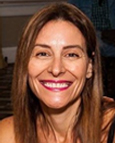 Angela Makris completed her Masters in Public Health with a concentration in Social Marketing from the University of South Florida. Her research and practice interest involve the application of a systems approach to social and behavioral theory for person -centered health behavior change, prevention and wellness for people with disabilities. Her professional goal is to apply the social marketing framework to decreasing health disparities for people with disabilities through health promotions initiatives. By adapting knowledge, facilitating uptake, and developing strategic partnerships to build community capacity and create sustainability. Angela envisions her research will lead to inclusive change for people with intellectual disabilities by integrating disability and health into existing health promotion activities.
Angela Makris completed her Masters in Public Health with a concentration in Social Marketing from the University of South Florida. Her research and practice interest involve the application of a systems approach to social and behavioral theory for person -centered health behavior change, prevention and wellness for people with disabilities. Her professional goal is to apply the social marketing framework to decreasing health disparities for people with disabilities through health promotions initiatives. By adapting knowledge, facilitating uptake, and developing strategic partnerships to build community capacity and create sustainability. Angela envisions her research will lead to inclusive change for people with intellectual disabilities by integrating disability and health into existing health promotion activities.
Image Description: A picture of a face. The image is cut off at their chest. They are looking straight at the camera and are smiling. Their lips are bright pink and their hair is light brown and falls to the right and left side of their face. They are wearing a black tank top. They are in a room and the flash light has highlighted their face and made the background dark.
1. How does the work you do center disabled people/people with disabilities?
Angela’s aims to use the social marketing framework, which consists of various theories that are used to identify behavioral determinants that can be modified to influence a target audience to voluntarily accept, reject, or abandon a behavior for the benefit of individuals, groups, or society. To date, this framework has not been properly applied to decrease health disparities for people disabilities.
2. How has your AUCD traineeship made you a better ally or self-advocate?
Angela’s work as an AUCD trainee has provided her with great opportunities to learn more about the health care system for people with disabilities and the impact this has on her research. The traineeship has provided Angela with access to resources, faculty and communities, otherwise not known to her, who are able to guide her in her research. The traineeship and the knowledge gained from it, has made Angela an advocate for people with disabilities in her capacity as a staff member at the College of Public Health at the University of South Florida.
3. What is one thing about your own ally ship or self-advocacy that you would like to improve, whether for your disability or other communities?
The one thing Angela would like to do is increase the use of social marketing, which is currently underutilized in disabilities and inclusion. Social marketing has been used in public health for over 30 years to address various health disparity issues through a systematic approach which has shown to work in changing behavior. Angela believes that social marketing may help create more inclusiveness for people with disabilities in healthcare services in general and health promotion programs in particular.
4. What is one obstacle or barrier (local, systemic, and/or policy) that you are addressing in your discipline in partnership with disabled people/people with disabilities?
The main obstacle Angela wants to address in is the lack of inclusion for patients with disabilities in health promotion activities. An area that Angela’s research is focusing on is understanding what the behavioral barriers of health care personnel are in creating inclusive health promotion activities for people with disabilities.
Tim Beighley
Discipline: Self-Advocacy
GA-LEND (GA)
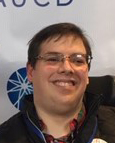 Tim Beighley is currently a trainee in the Georgia LEND program at Georgia State, helping to develop the Get Fit and Be Healthy program for those with intellectual disabilities. He received his Associates degree from Reinhardt University and his Bachelor’s degree in Applied Theology and Leadership from Aiden University in 2018. He is a disability advocate; having completed the All About Developmental Disabilities and the My Voice, My Participation, My Board programs. He is also a certified chaplain. Tim believes his purpose for his life is to encourage and inspire others. When not advocating for those with disabilities, Tim’s passion is baseball and his favorite team is the Atlanta Braves. It is his hope one day to be a chaplain for the Braves. Tim is a first year trainee in LEND program at Georgia State. He is currently working with a team on helping to develop the Get Fit and Be Healthy program.
Tim Beighley is currently a trainee in the Georgia LEND program at Georgia State, helping to develop the Get Fit and Be Healthy program for those with intellectual disabilities. He received his Associates degree from Reinhardt University and his Bachelor’s degree in Applied Theology and Leadership from Aiden University in 2018. He is a disability advocate; having completed the All About Developmental Disabilities and the My Voice, My Participation, My Board programs. He is also a certified chaplain. Tim believes his purpose for his life is to encourage and inspire others. When not advocating for those with disabilities, Tim’s passion is baseball and his favorite team is the Atlanta Braves. It is his hope one day to be a chaplain for the Braves. Tim is a first year trainee in LEND program at Georgia State. He is currently working with a team on helping to develop the Get Fit and Be Healthy program.
Image Description: Picture of a young man smiling, dressed in a red shirt, khaki pants and black vest. He has short hair and glasses. He is in a power chair, in front of the AUCD 2018 conference background and is holding a “We All Belong Here” sign.
1. How does the work you do center disabled people/people with disabilities?
In Tim’s first year as a trainee with the Georgia LEND program, he is on a team that is working to help people with intellectual disabilities to lose weight and teach them how to cook and exercise better.
2. How has your AUCD traineeship made you a better ally or self-advocate?
Tim has learned about other disabilities and been introduced to people that work in all areas of the disability community.
3. What is one thing about your own ally ship or self-advocacy that you would like to improve, whether for your disability or other communities?
Tim would like to continue to learn how to work with people with autism more effectively.
4. What is one obstacle or barrier (local, systemic, and/or policy) that you are addressing in your discipline in partnership with disabled people/people with disabilities?
Independent Living for people with disabilities is an area Tim sees as an obstacle.
Mia Giglio
Discipline: English, Justice Studies
Center on Disabilities and Human Development (ID)
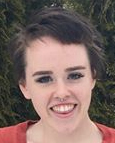 Mia Giglio is a University of Idaho student studying English with an emphasis in Creative Writing and a minor in Justice Studies. Mia is also an undergraduate Interdisciplinary Trainee at the Center on Disabilities and Human Development (CDHD). In their time at CDHD, Mia has worked on a variety of projects, and for the last two years she has been working as the artAbility Project Leader. artAbility, a student-led project, provides adults with developmental disabilities access to free, fine arts workshops which are led by local, professional artists and assisted by fellow University of Idaho student volunteers.
Mia Giglio is a University of Idaho student studying English with an emphasis in Creative Writing and a minor in Justice Studies. Mia is also an undergraduate Interdisciplinary Trainee at the Center on Disabilities and Human Development (CDHD). In their time at CDHD, Mia has worked on a variety of projects, and for the last two years she has been working as the artAbility Project Leader. artAbility, a student-led project, provides adults with developmental disabilities access to free, fine arts workshops which are led by local, professional artists and assisted by fellow University of Idaho student volunteers.
Image Description: A picture of Mia standing in front of tall bushes. They are smiling and wearing a burnt orange sweater. Their short dark brown hair is parted to the side.
1. How does the work you do center disabled people/people with disabilities?
The artAbility project aims to empower adults with developmental disabilities through the fine arts. Throughout the years artAbility has been able to work alongside local, professional artists to create a series of workshops that are enjoyable for participants that also challenge them creatively. Each workshop is assisted by University of Idaho student volunteers who are required to attend a disability etiquette seminar, which educates students on respectful interactions and the challenges people with disabilities may face. Each piece of the project is designed to provide adults with disabilities a platform to express themselves and connect with the community, especially at our artAbility Showcase, where participants can display and sell their work to community members.
2. How has your AUCD traineeship made you a better ally or self-advocate?
Growing up with a brother with Down’s syndrome and Autism, Mia had a lot of opportunities to work with disability. Their family has worked hard to ensure that their brother can communicate consistently and accurately, but even with assistive technology and different types of therapy, he is still unable to consistently communicate. For most of their life, their primary goal was to give a voice to the people who may struggle to use their own. Through artAbility, Mia has been able to learn how to better support the voices of people with disabilities without speaking on behalf of them. As project leader, their ultimate goal is to provide adults with disabilities a chance to use the voice they already have and express that through artistic endeavors.
3. What is one thing about your own ally ship or self-advocacy that you would like to improve, whether for your disability or other communities?
As a queer person, Mia sees the lack of accessibility in queer spaces quite disheartening. Typically Pride Festivals and Parades do not have adequate accommodations for people with mobility concerns, or accommodations for individuals that may experience sensory overload. It is their personal goal to promote accessibility within queer spaces so the queer community can celebrate everyone’s differences together.
4. What is one obstacle or barrier (local, systemic, and/or policy) that you are addressing in your discipline in partnership with disabled people/people with disabilities?
Recently the artAbility project delved into poetry. As an English Major, the idea of hosting a poetry workshop was exciting to Mia, however many of the artAbility participants struggle with reading and writing. Despite popular belief, poetry is one of the most accessible forms of writing. Poems can be short, sweet, and to the point, but their team had to find a way to ensure the participants had positive experiences writing. They addressed this concern by training volunteers to act as scribes for participants. Each volunteer was paired with a participant, and during the workshop volunteers were instructed to ask participants questions to help brainstorm, and to write down the poems for participants.
Eric Desmarais
Discipline: Clinical Psychology
Center on Disabilities and Human Development (UT)
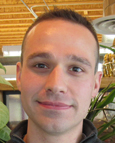 Eric is a graduate student pursuing a Ph.D. in clinical psychology with a focus on children and development. Although a student of Washington State University, he participates in the Utah Regional LEND program and is completing his second year as a trainee at the University of Idaho Center on Disabilities and Human Development (CDHD). As a trainee, Eric is gaining valuable skills in assessments and interventions for children with disabilities and their families. He enjoys providing community outreaches (e.g., providing mental health trainings to emergency telecommunicators) and consulting with other healthcare providers to improve access to care and quality of life for people with disabilities. After completing his training with the LEND program and the CDHD, Eric will complete a year-long internship to finish his PhD in hopes of returning to the pacific northwest to bring quality, evidence-based services to families in rural communities.
Eric is a graduate student pursuing a Ph.D. in clinical psychology with a focus on children and development. Although a student of Washington State University, he participates in the Utah Regional LEND program and is completing his second year as a trainee at the University of Idaho Center on Disabilities and Human Development (CDHD). As a trainee, Eric is gaining valuable skills in assessments and interventions for children with disabilities and their families. He enjoys providing community outreaches (e.g., providing mental health trainings to emergency telecommunicators) and consulting with other healthcare providers to improve access to care and quality of life for people with disabilities. After completing his training with the LEND program and the CDHD, Eric will complete a year-long internship to finish his PhD in hopes of returning to the pacific northwest to bring quality, evidence-based services to families in rural communities.
Image Description: Eric Desmarais is standing in front of two file cabinets with one plant to the left of his face and another to the right. The image is cut-off at his chest. His hair is very short, and he is smirking.
1. How does the work you do center disabled people/people with disabilities?
Working most often with young children, Eric is sometimes the first person to inform caregivers that their child has a disability. In these life changing moments, parents can often feel hopeless and unsure of how to help their child. He works to dispel myths and stereotypes about people with disabilities. He collaborates with families to develop a mindset in which the focus is not on what a child can’t do, but instead on what supports might be necessary for a child to participate in whatever activity they would like to enjoy. Similarly, when providing trainings and outreaches, Eric works to promote inclusion and develop practices that enhance accessibility to people with disabilities and, again, advocates for a focus on enhancing accessibility rather than fixating on perceived barriers.
2. How has your AUCD traineeship made you a better ally or self-advocate?
Eric believes the URLEND experience has been one of the most valuable components of his entire graduate education. Through this program he has learned about the vast community of stakeholders, healthcare professionals, and allies with whom he can collaborate and leverage collective resources to make meaningful changes for families. He believes the program has enhanced his ability to communicate across disciplines and to take a family- and client-centered approach to in his clinical work. Through his experiences at the CDHD/LEND, Eric has gained valuable insights into what inclusion and accessibility mean in a practical sense, and how they can be implemented on a large-scale.
3. What is one thing about your own ally ship or self-advocacy that you would like to improve, whether for your disability or other communities?
Although Eric has worked extensively with children and families throughout his career, he would like to gain experience working with older adolescents and adults with disabilities. He would like to learn about the experiences of people with disabilities as they transition to adulthood and various forms of independent living. Eric believes that understanding disabilities from a life course perspective will allow him to better prepare children and their families for this transition sooner while also enhance his abilities to advocate for adult services and supports.
4. What is one obstacle or barrier (local, systemic, and/or policy) that you are addressing in your discipline in partnership with disabled people/people with disabilities?
Throughout his LEND training, Eric has focused his research on practice on improving inclusion in the academic setting for individuals with disabilities. At the center of this work are the expressed needs of individuals and their families. Thus, he and other members of the CDHD partner with the community to support self-advocacy as well as providing educational evaluations, supporting individuals and families in individualized education program meetings, and providing educational outreaches to the community. Additionally, the members of the CDHD have formed powerful collaborative relationships with local schools and are able to work synergistically to provide creative solutions to student needs even in the context of a rural community. By leveraging additional resources at the CDHD (e.g., the Special Education Support and Technical Assistance project and the Idaho Assistive Technology Project), they provide a space for people with disabilities to express their needs and know that the CDHD will work to eliminate barriers and support their success.
Helen Rottier
Discipline: Disability Studies
Institute on Disability & Human Development (UCEDD)(IL)
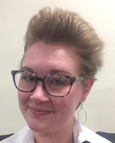 Helen Rottier is a graduate student in disability studies at the University of Illinois at Chicago and is a dual AUCD Emerging Leader as a 2018-19 LEND Trainee and a student and research assistant in the Illinois UCEDD. Her research focuses on higher education access for autistic and neurodivergent students, and current projects include facilitating an autistic student community in the Chicago-area and conducting a national survey on student experiences as part of her LEND research. Helen identifies as neurodivergent and believes that neurodivergent students and academics have unique skills to offer in research and scholarship. She is originally from Wisconsin and graduated with her BS in Psychology from the University of Wisconsin-Madison (Go Badgers!) If you are interested in Helen’s work, advocacy, or thoughts on sitcoms and soap operas, you can follow her on Twitter @helenrottier.
Helen Rottier is a graduate student in disability studies at the University of Illinois at Chicago and is a dual AUCD Emerging Leader as a 2018-19 LEND Trainee and a student and research assistant in the Illinois UCEDD. Her research focuses on higher education access for autistic and neurodivergent students, and current projects include facilitating an autistic student community in the Chicago-area and conducting a national survey on student experiences as part of her LEND research. Helen identifies as neurodivergent and believes that neurodivergent students and academics have unique skills to offer in research and scholarship. She is originally from Wisconsin and graduated with her BS in Psychology from the University of Wisconsin-Madison (Go Badgers!) If you are interested in Helen’s work, advocacy, or thoughts on sitcoms and soap operas, you can follow her on Twitter @helenrottier.
Image Description:Photo shows Helen, a young white woman, smiling with a blank white wall behind her. Helen has short blonde hair, rainbow tortoiseshell glasses, and is wearing a white collared shirt, black blazer, silver earrings, and a button showing the neurodiversity symbol, a rainbow-colored infinity sign.
1. How does the work you do center disabled people/people with disabilities?
As a disabled researcher, Helen uses her connection to the autistic and neurodivergent community to inform her research priorities and guide her current work on access in higher education. Her passion for academic accessibility stems from her own experiences as a neurodivergent student and scholar, but she relies on the expertise of other disabled and neurodivergent individuals to further her understanding of academic ableism and autistic/neurodivergent scholarship. Mainstream autism research focuses largely on cause and cure, but Helen’s work disrupts the mainstream to address the questions autistic people want answered.
2. How has your AUCD traineeship made you a better ally or self-advocate?
As an AUCD trainee, Helen has developed her advocacy skills to educate future clinicians on autistic community, culture, and dignity and to work interdependently, sharing her skills and learning with other disabled trainees. She has presented perspectives on diagnosis, intervention, and outcomes, debunked myths surrounding autism and neurodiversity, and highlighted autistic community and culture to educate fellow trainees in disability studies and pre-clinical disciplines. By engaging in discussions, answering questions, and sharing her expertise in accessible event-planning and survey design, Helen is a resource to her fellow trainees and the Illinois LEND and UCEDD programs.
3. What is one thing about your own ally ship or self-advocacy that you would like to improve, whether for your disability or other communities?
One practice Helen is working to improve is centering and collaborating with autistic/disabled people of color in her research. The autistic and disability communities continuously privilege white activists and scholars, and Helen is working to consciously interrogate her privilege and to listen and learn from people of color. She is grateful for the leadership and perspectives of Lydia X.Z. Brown, Timotheus Gordon, Jr., and Morénike Giwa Onaiwu, who write at the intersections of race and autism. It is especially critical to explore how autistic people of color access and experience higher education differently due to systemic oppression and racist/ableist gatekeeping within academia.
4. What is one obstacle or barrier (local, systemic, and/or policy) that you are addressing in your discipline in partnership with disabled people/people with disabilities?
Even within disability studies programs, academia remains deeply and inherently inaccessible, yet academic certification is required to access many professions and aspects of society. Helen’s research simultaneously seeks to increase for disabled and neurodivergent individuals in academic institutions and to radically reimagine education and knowledge production beyond such institutions. By valuing the expertise and scholarship of autistic and neurodivergent individuals, even when or especially when it differs from academic ideals, Helen is committed to increasing access to education, research, and scholarship.
Hena Thakur
Discipline: Psychology
Institute on Disability & Human Development (IL)
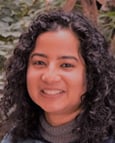 Hena Thakur graduated from Boston University with a degree in Medical Sciences. Post-graduation, she completed a postbaccalaureate program at the National Institutes of Health (NIH). While at NIH, Hena was involved in a project that studied the role of social networks for caregivers. Through her work on this project, Hena gained an ecological perspective on stressors that impact health within family systems. Hena was particularly struck by the far-reaching effects of federal and state policies on mental health access and treatment. This experience cultivated Hena’s interest in mental health policy. As a graduate student at the University of Illinois at Urbana-Champaign, Hena is interested in advancing mental health screening protocols for youth across different applied settings. Her most recent work has addressed several limitations across screening procedures, including integration of multi-informant reports, utilization of broadband symptom inventories, inclusion of concurrent and prospective risk, and assessment of incremental validity.
Hena Thakur graduated from Boston University with a degree in Medical Sciences. Post-graduation, she completed a postbaccalaureate program at the National Institutes of Health (NIH). While at NIH, Hena was involved in a project that studied the role of social networks for caregivers. Through her work on this project, Hena gained an ecological perspective on stressors that impact health within family systems. Hena was particularly struck by the far-reaching effects of federal and state policies on mental health access and treatment. This experience cultivated Hena’s interest in mental health policy. As a graduate student at the University of Illinois at Urbana-Champaign, Hena is interested in advancing mental health screening protocols for youth across different applied settings. Her most recent work has addressed several limitations across screening procedures, including integration of multi-informant reports, utilization of broadband symptom inventories, inclusion of concurrent and prospective risk, and assessment of incremental validity.
Image Description: A female is seated on a granite surface. The image is cut off at her waist. She has shoulder length, curly black hair. She is wearing a turtle neck that has various colored stripes on it, including gray, dark blue, light blue, white, black, and purple. She is looking straight at the camera and smiling. Behind her is a rock and various green plants.
1. How does the work you do center disabled people/people with disabilities?
Broadly, Hena is interested in developing methods for easy-to-implement screening protocols. Her work addresses current shortcomings in screening for mental health concerns, particularly depression, and she also has an interest in understanding the applicability of screening protocols across different populations. The disability community is a highly heterogeneous population, however current screening protocols for mental health concerns have not been well studied within this community. Hena hopes to address that gap and to urge others to continue advancing such work.
2. How has your AUCD traineeship made you a better ally or self-advocate?
Hena has had many opportunities to engage in conversations with individuals who have identified as being disabled, and these conversations have allowed her to better understand lived experiences that are different from her own. As such, she has been able to better examine some of her “blind spots” and has sought out outlets that will enable her to stay informed and connected to the disability community. The traineeship has also exposed her to different methods of effective advocacy and has helped her feel more confident within spaces that are advocacy-centered.
3. What is one thing about your own ally ship or self-advocacy that you would like to improve, whether for your disability or other communities?
As an emerging clinician, researcher and ally, Hena struggles, at times, to understand how the intersectionality between these different identities may impact her advocacy abilities. In other words, her perspective on certain matters may vary based on whether she is in a clinician, researcher, or advocacy role. When these opinions are conflicted, Hena is working on understanding how and why it may be necessary to reconcile her differing viewpoints. In addition, she is still navigating how expectations within these different roles may legally or ethically restrict her ability to “act on” certain matters. Nevertheless, Hena is determined to continue to push herself to advocate on matters that are important to her, as well as those she encounters within her different communities. everyone’s differences together.
4. What is one obstacle or barrier (local, systemic, and/or policy) that you are addressing in your discipline in partnership with disabled people/people with disabilities?
As a clinical psychology student, Hena is in the unique position of acquiring research and clinical experience. Within these different roles, Hena has noticed that access to mental health services varies across localities, particularly for individuals with disabilities. Hena hopes that her work on screening protocols will help to address the need for better mental health services. Her LEND project aims to develop screening protocols for social impairment among students with learning disabilities, and she hopes to help inform policy efforts surrounding this field of research.
Sarah Girresch-Ward
Discipline: Psychology
Schiefelbusch Institute for Life Span Studies (LEND) (KS)
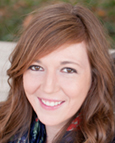 Sarah Girresch-Ward is a postdoctoral psychology and LEND fellow at the University of Kansas Medical Center. She previously completed a clinical psychology internship at WellSpan Health in Pennsylvania and earned a Ph.D. in counseling psychology from Tennessee State University in August 2018. She hopes to someday work as a pediatric psychologist in an academic medical setting assisting children and teens with neurodevelopmental disorders and complex medical issues. She is passionate about social justice and supporting under-served and marginalized populations, including LGBTQ youth, persons of color, and individuals with disabilities. In her free time, she enjoys running, trying new restaurants, shopping at local book/record stores, taking road trips, and going to concerts.
Sarah Girresch-Ward is a postdoctoral psychology and LEND fellow at the University of Kansas Medical Center. She previously completed a clinical psychology internship at WellSpan Health in Pennsylvania and earned a Ph.D. in counseling psychology from Tennessee State University in August 2018. She hopes to someday work as a pediatric psychologist in an academic medical setting assisting children and teens with neurodevelopmental disorders and complex medical issues. She is passionate about social justice and supporting under-served and marginalized populations, including LGBTQ youth, persons of color, and individuals with disabilities. In her free time, she enjoys running, trying new restaurants, shopping at local book/record stores, taking road trips, and going to concerts.
Image Description: A woman with fair skin, curly reddish-brown hair, and brown eyes is smiling with her head turned at an angle that is slightly to the left. The image is cropped around her head and cut off at her shoulders. She is wearing a scarf with an abstract green, pink, and blue pattern. Behind her is a blurred backdrop of grey concrete, green grass, and brown leaves.
1. How does the work you do center disabled people/people with disabilities?
Sarah makes active efforts to center the voices and experiences of people with disabilities in her work at KU Medical Center, which includes evaluation, therapy, and consultation services primarily for children with autism spectrum disorder and other developmental needs. Clinically, she works hard to establish strong, collaborative partnerships with patients and their caregivers by prioritizing their needs and goals, as well as providing evidence-based information in a manner that can be understood and applied according to their cultural and contextual background. Approaching her work from person-centered and strength-based perspectives, she focuses on helping children and teens of different abilities recognize and reach their potential. From her doctoral training at a historically black university, Sarah has also learned to check her privilege(s) and listen to the narratives of others who have been oppressed by systems of care, including individuals with disabilities.
2. How has your AUCD traineeship made you a better ally or self-advocate?
Sarah’s AUCD traineeship has made her a better ally by increasing her insight into the lived experiences of people with disabilities and their families. Most valuable has been learning alongside self- and parent-advocates. In November 2018, Sarah had the privilege of attending the annual AUCD conference in Washington DC. During the conference, she was fortunate to participate in Capitol Hill visits to advocate for legislation in support of individuals with autism. Most impactful was sitting in the presence of one very brave and inspiring self-advocate and several incredibly dedicated parent advocates as they shared their experiences with Hill staffers and communicated the importance of federal funding for programs dedicated to supporting people with developmental differences. It was through this experience that Sarah learned how to share her expertise where it is needed or wanted (i.e., by sharing relevant evidence-based information), while bolstering and centering the voices most impacted by policy decisions.
3. What is one thing about your own ally ship or self-advocacy that you would like to improve, whether for your disability or other communities?
Sarah is continuing to work on increasing her insight and knowledge regarding intersectionality as it relates to disability issues. In recent years, Sarah has experienced a growing interest in wanting to support gender variant children, teens, and young adults who are on the autism spectrum. It is through clinical experiences with this unique population that Sarah has become more aware that she has so much more to learn to become a better ally! Currently, she is involved in a research project with a fellow LEND trainee investigating the documentation of gender identity in the electronic medical record and assessing awareness and comfort levels of medical/mental health professionals providing services to gender and neuro-diverse patients. It is hoped that the results of this project will improve access to quality health care and supportive services for this population, as well as enhance allyship for social justice-minded providers like Sarah!
Sarah has made it a priority in her current position as a psychology and LEND fellow at KU Medical Center to bring awareness to the intersection of neurodiversity and gender diversity. She is passionate about providing affirming health care for gender variant individuals who have developmental disabilities and differences, including those with autism spectrum disorder. This passion has fueled her interest in pursuing a research project in this area, which was made possible through collaborative efforts with her fellow LEND trainee and research mentor at KU Medical Center. Sarah focuses on these efforts largely informed by partnership with gender variant persons with developmental differences, whether by attending to the unique health care needs of gender/neuro-diverse patients or consulting qualitative literature that centers the nuanced and varied narratives typically not accounted for in quantitative, large-scale studies.
Eve Kronzek
Discipline: Pediatric Audiology
Kennedy Krieger Institute, LEND (MD)
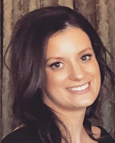 Eve Kronzek is an audiology resident and LEND trainee at the Kennedy Krieger Institute in Baltimore, Maryland. After graduating from the University of Maryland with her B.A. in Hearing and Speech Sciences, she continued her education at the University of Maryland in the Doctor of Audiology program. During her time in the doctorate program, Eve has worked at a wide range of clinical pediatric settings, including in a public school setting, at Walter Reed National Military Medical Center in the pediatric audiology department, and now at the Kennedy Krieger Institute. Her desire to pursue a career working with and advocating for individuals with developmental and other disabilities began when working in an inclusion summer camp, and her desire to work with individuals with disabilities has continued to grow. She is excited to be featured on the AUCD Emerging Leaders Map, and to highlight the work being done at the Kennedy Krieger institute.
Eve Kronzek is an audiology resident and LEND trainee at the Kennedy Krieger Institute in Baltimore, Maryland. After graduating from the University of Maryland with her B.A. in Hearing and Speech Sciences, she continued her education at the University of Maryland in the Doctor of Audiology program. During her time in the doctorate program, Eve has worked at a wide range of clinical pediatric settings, including in a public school setting, at Walter Reed National Military Medical Center in the pediatric audiology department, and now at the Kennedy Krieger Institute. Her desire to pursue a career working with and advocating for individuals with developmental and other disabilities began when working in an inclusion summer camp, and her desire to work with individuals with disabilities has continued to grow. She is excited to be featured on the AUCD Emerging Leaders Map, and to highlight the work being done at the Kennedy Krieger institute.
Image Description: A picture of a person standing in front of a beige background. The image is cut off at their chest. They are looking straight at the camera, turning right slightly, and are smiling. Their hair is dark brown, curled, and chest length and is falling on the right side of their face. They are wearing a black scoop neck top and a gold necklace.
1. How does the work you do center disabled people/people with disabilities?
A core value of the Kennedy Krieger Institute is to improve the lives of children and young adults with developmental disabilities and disorders of the brain through interdisciplinary treatment approaches that are tailored to the individual needs of each child. For each individual patient, clinicians identify their strengths and areas in need of additional support, and collaborate with multiple disciplines in order to identify the most optimal method of treatment for that individual child, and their family.
2. How has your AUCD traineeship made you a better ally or self-advocate?
Through Eve’s clinical experiences at her AUCD traineeship she has learned to understand and appreciate that the challenges met by individuals with disabilities and their families are complex. She feels that part of being an effective clinician is to provide appropriate support and care to these individuals and their families. Her time as an AUCD trainee has only furthered her belief in this important principle, and has emphasized her desire to continue to be an advocate and resource for individuals with disabilities, and for their families.
3. What is one thing about your own ally ship or self-advocacy that you would like to improve, whether for your disability or other communities?
One thing that Eve would like to improve is discussion with patients with disabilities regarding their own thoughts and feelings concerning self-advocacy. Oftentimes in audiology, patients may express self-conscious feelings regarding hearing aid use in classroom and social settings. Eve would like to develop her skills surrounding having conversations with patients with hearing loss, and counseling them in order to improve their own self-advocacy and management strategies.
4. What is one obstacle or barrier (local, systemic, and/or policy) that you are addressing in your discipline in partnership with disabled people/people with disabilities?
One obstacle that Eve is addressing in her discipline is improving awareness and understanding of clinicians and physicians regarding evaluations and treatments for hearing in disabled people/people with disabilities. Eve and the other audiologists at the Kennedy Krieger Institute have given multiple presentations to trainees and staff at the institute in order to explain hearing loss and how it can affect people with disabilities. One presentation given was to all the LEND trainees at the institute in a weekly core course. Additionally, Eve has given a presentation to speech/language pathology clinical fellows and discussed special considerations for working with individuals with hearing loss.
Da-Yea Song
Discipline: Psychology and Public Health
Kennedy Krieger Institute (MD)
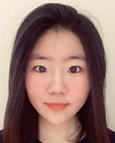 Having grown up in Asia, the Middle East, Europe, and Africa, Da-Yea Song was always surrounded by individuals from diverse cultural backgrounds which eventually helped her develop a unique lens of viewing the world. It was during her graduate program at Johns Hopkins University where she became a UCEDD trainee at the Maryland Center for Developmental Disabilities (MCDD). Being a part of a medical-legal partnership, Project HEAL (Health, Education, Advocacy and Law) at MCDD, she had the opportunity to see first-hand how social determinants that affect the well-being of an individual are often heavily influenced by legal issues. Since her graduation in May 2018, she has been working as a research assistant at the Center for Neurodevelopmental and Imaging Research, Kennedy Krieger Institute. She aspires to become a clinical neuropsychologist by protecting and improving the physical and mental well-being of children with neurodiversity.
Having grown up in Asia, the Middle East, Europe, and Africa, Da-Yea Song was always surrounded by individuals from diverse cultural backgrounds which eventually helped her develop a unique lens of viewing the world. It was during her graduate program at Johns Hopkins University where she became a UCEDD trainee at the Maryland Center for Developmental Disabilities (MCDD). Being a part of a medical-legal partnership, Project HEAL (Health, Education, Advocacy and Law) at MCDD, she had the opportunity to see first-hand how social determinants that affect the well-being of an individual are often heavily influenced by legal issues. Since her graduation in May 2018, she has been working as a research assistant at the Center for Neurodevelopmental and Imaging Research, Kennedy Krieger Institute. She aspires to become a clinical neuropsychologist by protecting and improving the physical and mental well-being of children with neurodiversity.
Image Description: This is a picture of an Asian female looking straight at the camera in front of a clear white background. The image is cut off at the chest, and she is wearing a black v-neck shirt. She has medium length black hair that is curled up near the ends. She has dark brown eyes, rosy cheeks, and a warm smile.
1. How does the work you do center disabled people/people with disabilities?
As a former UCEDD trainee with Project HEAL, a medical-legal partnership, Da-Yea got to witness a team of devoted attorneys address the civil legal issues that children and families with neurodevelopmental disorders face in their everyday lives. It was through this invaluable experience that she learned the importance of collaboration between legal and clinical professionals to ensure that each individual with disabilities obtains their equal rights to be given a fair opportunity to reach their full potential. Her time as a trainee at MCDD has taught her the importance of maintaining an open heart and being respectfully aware that everyone has a different story to tell. Having a strong research background from previous lab positions, Da-Yea hopes to combine her unique skill sets and lessons learned from her training and continue on this path by working with children with neurodevelopmental disorders.
2. How has your AUCD traineeship made you a better ally or self-advocate?
Being a close partnership between attorneys and clinical professionals to help each child and their families to their need, Project HEAL provided Da-Yea with a project to evaluate the successful ripple effect it has had. She had the opportunity to apply what she learned in the classrooms to the real outside world by building, administering and analyzing the survey results of 100 professionals throughout the institute. Her interactions during her traineeship have been eye-opening and allowed her to move away from solely focusing on the symptoms or diagnosis of an individual by providing insight into the challenges that families and children with disabilities experience beyond the clinical settings. Seeing the attorneys at Project HEAL commit to listening and centering the individual during every process of their work has been a heartfelt lesson that she will cherish as she continues in this field as a researcher and advocate.
3. What is one thing about your own ally ship or self-advocacy that you would like to improve, whether for your disability or other communities?
One thing that Da-Yea has strongly felt during her training experience was centered on the topic of inclusion. Project HEAL strives to ensure that each child with disabilities receive the appropriate education and related services matched to their needs by recognizing that each case is unparalleled. With this core value at heart, she attended the AUCD Conference 2018 where she had the privilege of engaging with the Council on Research and Evaluation (CORE). The discussions from this event sparked insight as to the limitations and room for improvements when conducting research. It made Da-Yea think about her past and current projects and brainstorm ideas as to what could be done differently moving forward. She hopes to incorporate these foundational values into her work and improve in ways to enhance inclusion as she continues to work in a setting centered on children with neurodevelopmental disorders.
4. What is one obstacle or barrier (local, systemic, and/or policy) that you are addressing in your discipline in partnership with disabled people/people with disabilities?
As a graduate student in the school of public health at Johns Hopkins University, the importance of communication was always emphasized to Da-Yea. During her traineeship at Project HEAL, it became apparent to her that all of their work was strongly based on team effort with actively ongoing discussions with the child or legal guardian about their plans and goals. The attorneys at Project HEAL helped empower families by having their voices be heard. Unfortunately, with the limited amount of resources, not everyone has access to this opportunity. Having seen the synergy effect of communication and cooperation result in positive outcomes, Da-Yea strives to find the most effective ways of sharing information using diverse methods and including it in her everyday job process so that it may be reached to those who are in most need.
Suad Salad
Discipline: Public Health
MN LEND
 Suad Salad is one of the many Somalis who arrived as refugees fleeing a civil war in their homeland. Her family was one of the earlier immigrant communities to arrive in Minnesota in 1995. She comes from large family and is the second youngest out of nine siblings. Both of her parents are alive and well. She works for the Early Childhood Division for Minneapolis Public Schools. Suad feels it is an honor to be a participant in the MNLEND Program in 2018-2019. She is learning much from the program, most importantly, new ways to help families with children with NDD who need screening, treatments, and interventions because more often underserved populations are unaware of the importance of early treatment and early detection of delayed learning and development. She hopes to grow as an emerging leader in the community efforts to reach positive changes in obtaining access and support for children with neurodevelopment disabilities. Suad’s work relates to early intervention programs and she focuses on improving service delivery to multilingual and underserved young children (3-5 years) with ASD and supporting families. As both Minneapolis Public School (MPS) staff and a MNLEND Fellow 2018-2019, she is part of their continuing collaborative partnership and evaluation project to analyze the effectiveness of MPS services and processes for multilingual children and families who receive services in the Early Education, Special Education, and Multilingual Departments.
Suad Salad is one of the many Somalis who arrived as refugees fleeing a civil war in their homeland. Her family was one of the earlier immigrant communities to arrive in Minnesota in 1995. She comes from large family and is the second youngest out of nine siblings. Both of her parents are alive and well. She works for the Early Childhood Division for Minneapolis Public Schools. Suad feels it is an honor to be a participant in the MNLEND Program in 2018-2019. She is learning much from the program, most importantly, new ways to help families with children with NDD who need screening, treatments, and interventions because more often underserved populations are unaware of the importance of early treatment and early detection of delayed learning and development. She hopes to grow as an emerging leader in the community efforts to reach positive changes in obtaining access and support for children with neurodevelopment disabilities. Suad’s work relates to early intervention programs and she focuses on improving service delivery to multilingual and underserved young children (3-5 years) with ASD and supporting families. As both Minneapolis Public School (MPS) staff and a MNLEND Fellow 2018-2019, she is part of their continuing collaborative partnership and evaluation project to analyze the effectiveness of MPS services and processes for multilingual children and families who receive services in the Early Education, Special Education, and Multilingual Departments.
Image Description: This is a picture of Suad Salad, sitting at her concierge desk of Walker Methodist Assistant Living Apartment. The image is selfie taken at the other job she does besides working for Minneapolis Public Schools. She is sitting at her work desk area, a cut off head shot picture. She is wearing a navy-blue hajib and her prescription glasses on her head. The background shows a computer monitor and a walkie talkie to communicate with staff members in the building.
1. How does the work you do center disabled people/people with disabilities?
JEarly Childhood Screening is the crucial step for children to get early support services and to have families to learn more about early education programs that are available in their community. Screening provides opportunities for children of age 3-5 and families to access a wide variety of services. This initial point of her work entitles supporting parents’ understanding of their child’s health, development, and learning.
2. How has your AUCD traineeship made you a better ally or self-advocate?
AUCD (MNLEND) has provided a better understanding what it means to be serving people with disabilities and their families. AUCD was able to help see the bigger picture of policy change and how that is tied to her line of work. For example, the renewal of the Autism Cares Act is something she looks forward to supporting. Her traineeship gives her a chance to learn the professional competencies and skills to provide optimal care to children with learning delays and proper supports for their families.
3. What is one thing about your own ally ship or self-advocacy that you would like to improve, whether for your disability or other communities?
Suad wishes to continue to reach out to communities and talk about mental health. Open dialogue among families, parents, teachers and community leaders is needed for the success in achieving kindergarten readiness for children. As a community advocate leader, she witnesses firsthand the merits of early invention supports and knows well that the early identification of learning differences needs the cooperation of everyone. She would like to use her skills to help realize the Learn The Signs Act Early Initiative in Minnesota. She is focused on addressing her state’s capacity to support this process of early identification and early intervention, especially for underserved populations.
4. What is one obstacle or barrier (local, systemic, and/or policy) that you are addressing in your discipline in partnership with disabled people/people with disabilities?
Suad is addressing directly the systemic barriers many Minnesotan families are facing due to their refugee, immigrant, and citizenship status. She specifically works with families and supports their navigation of complex early identification and early interventions and supports with children in the Minneapolis Public Schools, which is the largest and most diverse school district in Minnesota. She supports the important work of reducing barriers to access supports and services for many children ages 3-5.
Macdonald Metzger
Discipline: Public Administration
University of Minnesota’s Research and Training Center on Community Living (MN)
 MacDonald M. Metzger, MSc, DPA. is an Education Program Specialist at University of Minnesota’s Research and Training Center on Community Living. MacDonald is also an alumni of the AUCD Leadership Academy. He currently serves as DirectCourse Quality Coordinator. DirectCourse is an online training curriculum designed to empower support and care professionals to help others lead meaningful lives within their communities. MacDonald is Quality Lead for the College of Direct Support curriculum. MacDonald research and practice interest include improving the quality of America’s direct support workforce through research, training and technical assistance to agencies, families, and individuals that support people with disabilities in the community.
MacDonald M. Metzger, MSc, DPA. is an Education Program Specialist at University of Minnesota’s Research and Training Center on Community Living. MacDonald is also an alumni of the AUCD Leadership Academy. He currently serves as DirectCourse Quality Coordinator. DirectCourse is an online training curriculum designed to empower support and care professionals to help others lead meaningful lives within their communities. MacDonald is Quality Lead for the College of Direct Support curriculum. MacDonald research and practice interest include improving the quality of America’s direct support workforce through research, training and technical assistance to agencies, families, and individuals that support people with disabilities in the community.
He is also passionate about expanding the work of his UCEDD outside the borders of the United States. Especially, by providing training and technical assistance to community-based organization that work with people with disabilities in under developed communities in Africa. Recently, MacDonald led community-based rehabilitation training efforts in Liberia (where he was born), and hopes to expand such training to other regions in Africa.
Image Description: A picture of a young black male in his thirties standing. The image is cut off at their chest. Their hair color is black, with fades to the side. They are wearing glasses, a green sweater, off-white shirt underneath with blue stripes. They are smiling with deep dimples to the left side of their jaw. Behind them is a yellow wall and a brown wooden bench.
1. How does the work you do center disabled people/people with disabilities?
The Community Living program area at ICI works to promote the inclusion and full participation of people with disabilities in the communities of their choice. Dr. Metzger’s work puts people with disabilities at the center of their own support. They, like all people, deserves to be in at the fore front of these services and supports they get, and be actively involved in making decision about those services. His work at ICI seeks to empower Direct Support Professionals and all frontline direct care workers with the tools and resources they need through training and providing technical assistance to provider agencies that work to improve the quality of supports for people with disabilities.
2. How has your AUCD traineeship made you a better ally or self-advocate?
As the saying goes, “No man is an Island”. To be able to do the great work we all do in our communities, it takes a village, it takes our allies. MacDonald’s AUCD traineeship has helped him become a resource to self-advocates, and an asset to his center. As an emerging leader in the field, he feels strongly about creating new relationships and nurturing existing ones at the local and national level in order to promote the work done at UCEDDs around the country. Each UCEDDs work is valuable to the field, but that value is communicated via the different networks through our allies and community partners. As an ally, Macdonald is using the skills he acquired from the leadership academy to grow his leadership portfolio.
3. What is one thing about your own ally ship or self-advocacy that you would like to improve, whether for your disability or other communities?
The one thing that Macdonald would like to improve is his ability to share more information about the work he does at his UCEDD, and how that aligns with his leadership goals, and the impact he wants to create in the lives of people supported, and the workforce in general.
4. What is one obstacle or barrier (local, systemic, and/or policy) that you are addressing in your discipline in partnership with disabled people/people with disabilities?
The one challenge that Macdonald and his colleagues are currently working to address in partnership with people with disabilities is the current workforce challenge that is facing provider agencies across the country. People are not really enjoying their lives as they would like mostly because of the current workforce crisis, he says. They are experiencing high turnovers among the people who provide support for them. Macdonald says this is very important to him and his colleagues, and should have by now caught the attention of policy makers everywhere in the country. He says he’s devoting the next year to provide technical assistance to agencies that are experiencing the brunt of the problem.
Jacqeline McGinley
Discipline: Social Work
Strong Center for Developmental Disabilities (NY)
 Jacqueline (Jackie) McGinley is a licensed social worker. She received her PhD in Social Welfare from the University at Buffalo in 2018 and her MSW from Rutgers University in 2007. Jackie has over 20 years of experience in the field, with five years of post-MSW practice experience supporting adults with intellectual and developmental disabilities (IDD) and their caregivers. She has worked in a variety of community-based practice settings in roles ranging from case manager to assistant executive director. As a scholar, Jackie’s research focuses on issues related to end-of-life care for older adults with IDD. She has published 8 articles on this subject and received two awards for her writings. She has also delivered professional presentations at more than 20 conferences locally, nationally, and internationally on issues of aging, serious illness, end-of-life, and disability. Most recently, she completed a funded translational research project exploring the last year of life for people with IDD in community residences.
Jacqueline (Jackie) McGinley is a licensed social worker. She received her PhD in Social Welfare from the University at Buffalo in 2018 and her MSW from Rutgers University in 2007. Jackie has over 20 years of experience in the field, with five years of post-MSW practice experience supporting adults with intellectual and developmental disabilities (IDD) and their caregivers. She has worked in a variety of community-based practice settings in roles ranging from case manager to assistant executive director. As a scholar, Jackie’s research focuses on issues related to end-of-life care for older adults with IDD. She has published 8 articles on this subject and received two awards for her writings. She has also delivered professional presentations at more than 20 conferences locally, nationally, and internationally on issues of aging, serious illness, end-of-life, and disability. Most recently, she completed a funded translational research project exploring the last year of life for people with IDD in community residences.
Image Description: A headshot of a female in her mid-thirties with her dark-hair cut in a bob. She is smiling at the camera and wearing a bold gold necklace with a black jacket.
1. How does the work you do center disabled people/people with disabilities?
For myriad reasons, people with disabilities have historically been mistreated by, excluded from, or chosen not to participate in research. Jackie strives to minimize these barriers by giving the voice of people with disabilities primacy in her scholarship. She has received training on participatory action research and translational research strategies as a means for achieving these goals. Jackie’s scholarship seeks to engage people with disabilities in all phases of the research process, from conceptualization to data collection and analysis to dissemination.
2. How has your AUCD traineeship made you a better ally or self-advocate?
As a LEND Fellow with the Strong Center for Developmental Disabilities (UCEDD) at the University of Rochester Medical Center, Jackie has had the privilege of spending significant time shadowing children with special healthcare needs and their families. She has a much richer understanding of the barriers to access that exist for children and their families, particularly during periods of personal transition and policy change. In many instances, the experiences of the families she interacted with differed from what she understood from the available research literature. Jackie now has a much deeper appreciation for the importance of intently listening. As an ally, she believes firmly in the importance of regularly engaging with the people she seeks to serve to ensure her work is in service to their most emergent needs.
3. What is one thing about your own ally ship or self-advocacy that you would like to improve, whether for your disability or other communities?
Jackie has spent over 20 years in the field of intellectual and developmental disabilities; five of those years were spent in practice as a licensed social worker. When she left practice to pursue her PhD, her mentor advised that she would support her pursuits but only if Jackie promised to minimize the divide that seemed to exist between practice and research. This continues to be her call to action as an ally to people with disabilities and other populations who are aging, experiencing serious illness, and nearing life’s end. Jackie continually seeks to improve the pipeline between practice and research, including the length of time it takes to translate meaningful research into improved practices.
4. What is one obstacle or barrier (local, systemic, and/or policy) that you are addressing in your discipline in partnership with disabled people/people with disabilities?
Advance care planning is a process by which people express their wishes should they become seriously ill and unable to speak for themselves; it ideally ensures those wishes are honored at the end of life. However, many people do not participate in advance care planning, including people with intellectual and developmental disabilities who often face unique obstacles when expressing and enacting their wishes. Jackie is currently engaged in an interdisciplinary research collaboration exploring barriers to and opportunities for integrating advance care planning into state-level service plans and meetings. Jackie has also led several educational events on this subject, including sensitively training people with disabilities and their allies on the advance care planning process.
Jessica Prokup
Discipline: Medicine
The Ohio State University Nisonger Center (OH)
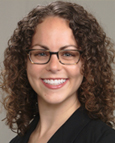 Jessica is a 4th year medical student at The Ohio State University College of Medicine. She is originally from Youngstown, Ohio and has an adult sibling with intellectual and developmental disabilities. Jessica has a passion for health equity and focuses her advocacy efforts on medical education. She worked alongside LEND faculty to create and implement a curriculum to teach Ohio State medical students about patients with disabilities. Jessica has conducted extensive healthcare disparity research about Ohioans with disabilities with manuscripts appearing in Annals of Family Medicine and Child Health Indicators. She has presented research posters and given talks at both local and national conferences. Jessica has held leadership positions in the American Academy of Developmental Medicine & Dentistry’s Virtual Grand Rounds Task Force as well as their Student/Resident Committee. She is pursuing a residency in Physical Medicine & Rehabilitation and hopes to focus her practice on adults with developmental disabilities.
Jessica is a 4th year medical student at The Ohio State University College of Medicine. She is originally from Youngstown, Ohio and has an adult sibling with intellectual and developmental disabilities. Jessica has a passion for health equity and focuses her advocacy efforts on medical education. She worked alongside LEND faculty to create and implement a curriculum to teach Ohio State medical students about patients with disabilities. Jessica has conducted extensive healthcare disparity research about Ohioans with disabilities with manuscripts appearing in Annals of Family Medicine and Child Health Indicators. She has presented research posters and given talks at both local and national conferences. Jessica has held leadership positions in the American Academy of Developmental Medicine & Dentistry’s Virtual Grand Rounds Task Force as well as their Student/Resident Committee. She is pursuing a residency in Physical Medicine & Rehabilitation and hopes to focus her practice on adults with developmental disabilities.
Image Description:Caucasian woman with brown curly shoulder-length hair and glasses smiles in image shot from the mid-chest up. She is turned slightly to the right and wearing a black suit with a white blouse and a silver necklace.
1. How does the work you do center disabled people/people with disabilities?
It is a well-studied fact that individuals with disabilities receive poorer quality healthcare and experience significant disparities as a result. The primary project Jessica undertook during medical school was to educate current medical students on caring for patients with developmental and other disabilities. Prior to this initiative, known as the LSI Disability Curriculum Initiative, there was little to no curricular content devoted to disability. The initiative consists of LEND faculty and staff, College of Medicine faculty, and LEND trainees (including medical students and IDD Psychology PhD candidates). Their efforts began with the creation of a 3rd year simulated patient experience during which students practice interviewing patients with a variety of disabilities. Once the team was awarded the NCIDM grant (National Curriculum Initiative in Developmental Medicine) in 2018, they were able to design and implement a 4-year disability curriculum at the college. To read more about this curriculum, please visit: http://nisonger.osu.edu/education-training/educating-medical-students-asd/
2. How has your AUCD traineeship made you a better ally or self-advocate?
LEND has afforded Jessica many opportunities and resources that she would not have otherwise had. They provide all the tools trainees need to better serve individuals with disabilities. The weekly seminars, clinic rotations, and community volunteering provided her with the educational content and professional experience she needed to personally improve her knowledge and skill set in working with this population. The research and leadership opportunities helped Jessica put this knowledge into practice for the betterment of the community. Her LEND mentors supported her projects both with their expertise and with needed funds. They went above and beyond to support her attendance at national conferences and public policy seminars and assisted her in networking for the advancement of her professional development. Jessica is so grateful to have received such valuable training and to be a lifelong trainee.
3. What is one thing about your own ally ship or self-advocacy that you would like to improve, whether for your disability or other communities?
As Jessica progressed in her medical education, she learned the vital role that public policy plays in both healthcare delivery and medical education. In order to be a more effective advocate, she believes she needs to become more knowledgeable on public policy as it relates to individuals with disabilities and the healthcare system. Jessica hopes to take the first step by attending the 2019 Disability Policy Seminar in Washington, D.C.
4. What is one obstacle or barrier (local, systemic, and/or policy) that you are addressing in your discipline in partnership with disabled people/people with disabilities?
One significant barrier that the LSI Disability Curriculum Initiative is addressing at The Ohio State University is physician communication with patients with intellectual disabilities. Studies have shown that physicians are uncomfortable interacting with patients with intellectual and developmental disabilities. A large contributor to this may be the lack of instruction and practice with this topic during medical school. The simulated patient experience that students complete at Ohio State is meant to address this deficit by allowing students a low pressure, structured environment in which to practice. People with developmental and other disabilities from the local Columbus community were recruited and hired by the College of Medicine as standardized patients. These individuals are trained to provide the students with constructive feedback after the encounter so they can continue to improve their skills. This educational experience would not be possible without these dedicated community members who wish to improve medical education.
Jade Clark
Discipline: Speech Language Pathology
University of Cincinnati Center for Excellence in Developmental Disabilities (OH)
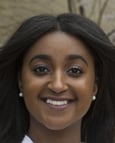 Jade Clark is a second year Speech-Language Pathology Master’s student and LEND trainee at the University of Cincinnati. She earned her Bachelor’s Degree in Communication Sciences and Disorders and Certificate in Spanish for Social Work and Health Care Services in 2017. She is currently in clinical rotations at Cincinnati Children’s Hospital in the Department of Developmental and Behavioral Pediatrics and in Cincinnati Public Schools, serving individuals with Down Syndrome, Autism Spectrum Disorder, Receptive and Expressive Language Delays and Disorders, and Speech Sound Disorders. She is particularly interested in early childhood language development and literacy. As a professional, she hopes to use her passion and the knowledge she has gained from her graduate coursework, clinical experiences, and LEND leadership training to provide evidence-based, family-centered intervention and advocate for children with speech and language disorders.
Jade Clark is a second year Speech-Language Pathology Master’s student and LEND trainee at the University of Cincinnati. She earned her Bachelor’s Degree in Communication Sciences and Disorders and Certificate in Spanish for Social Work and Health Care Services in 2017. She is currently in clinical rotations at Cincinnati Children’s Hospital in the Department of Developmental and Behavioral Pediatrics and in Cincinnati Public Schools, serving individuals with Down Syndrome, Autism Spectrum Disorder, Receptive and Expressive Language Delays and Disorders, and Speech Sound Disorders. She is particularly interested in early childhood language development and literacy. As a professional, she hopes to use her passion and the knowledge she has gained from her graduate coursework, clinical experiences, and LEND leadership training to provide evidence-based, family-centered intervention and advocate for children with speech and language disorders.
Image Description: A picture of a young black woman with straight dark brown hair standing in front of a sign and blossom trees on a sunny day. She is smiling with her teeth and her arms are crossed. She is wearing a pearl necklace, a white button-down shirt with a pin, and a black pencil skirt. The image is cut off right above her knees.
1. How does the work you do center disabled people/people with disabilities?
Jade’s current work involves evaluating children for speech and language disorders, as well as providing effective, engaging, and evidence-based intervention to support their communication goals and needs. Through her clinical experiences, Jade, alongside her supervisors, is sure to keep the children she serves and their families at the forefront of the evaluation and intervention processes. She is sure to always include the family when setting goals to ensure that the family’s concerns are being listened to and respected and that the child is working towards the most successful outcomes for them. She believes in providing the children with the supports that suit their specific communication needs whether that be through augmentative and alternative Communication devices, picture supports, literacy-based therapy, or play-based therapy.
2. How has your AUCD traineeship made you a better ally or self-advocate?
Jade’s LEND traineeship has been a catalyst in strengthening her allyship with individuals with disabilities and their families. The traineeship has provided her with essential history on disability and disability culture here in the U.S., the leadership and policy training necessary to most supportively advocate for individuals with disabilities, and clinical experiences where she is able to collaborate with families and various disciplines to evaluate children for communication disorders. Through her traineeship, she was also fortunate to have traveled to the 2018 AUCD conference in Washington DC where she was not only able to hear from leaders and researchers from across the nation on what they are doing to advocate for individuals with disabilities, but she was also able to speak with many members of the disability community themselves to hear their experiences and better learn what she can do to support them in her practice and in the community.
3. What is one thing about your own ally ship or self-advocacy that you would like to improve, whether for your disability or other communities?
While Jade has been learning about how to best support individuals with disabilities clinically, she recognizes that there is much more work to be done outside of the clinic office or classroom, and out in the community. She would like to engage in more advocacy and policy work that can affect change for individuals with disabilities on a broader level. An issue that interested her after attending the 2018 AUCD conference is how she, as an ally, can better support individuals with disabilities during their transition after high school. There has been a great deal of work put in so that individuals with disabilities have the opportunity to attend a 4-year college or university, but Jade wants to look into what she can do to help in the effort of ensuring that ALL students no matter level of functioning or socioeconomic status are afforded the same opportunities.
4. What is one obstacle or barrier (local, systemic, and/or policy) that you are addressing in your discipline in partnership with disabled people/people with disabilities?
Through her LEND traineeship Jade has had the opportunity to participate on a research project in collaboration with parents of children with Auditory Processing Disorder (APD) to hear their perceptions on APD and the effectiveness of interventions for the specific needs of their child. We want to know which providers they received intervention from, which specific types of intervention they received, and how effective they feel this intervention was for their child. Because there has been very little research done in this area, and because parents can provide some of the most valuable and honest information on their children’s strengths and challenges, we wanted to do conduct this study, in partnership with them, so that, moving forward, we can ensure that children are receiving effective intervention for APD.
Sarah Mueller
Discipline: Public Policy
Institute on Disabilities (PA)
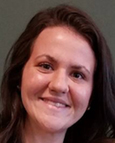 Sarah has a Bachelors in Special Education Eastern Michigan University, worked in the field as a high school special education teacher for students with intellectual disabilities in Rochester Hills, MI, and is now attending Temple University for a Master's degree in public policy. Sarah is a full-time AUCD trainee at the Institute on Disabilities providing: Technology Assistance for the College of Direct Support, Developmental Disabilities Council meeting support for Pennsylvania’s self advocates, supports the public policy team, and supported the Augmentative Communication Empowerment Supports (ACES) summer intensive. She attended two seminars on DD Policy: The DDAct and Bill of Rights and ID/DD Employment Policies. She is also concurrently pursuing a four-credit certificate in Disability Studies. During this time, Sarah has engaged in public policy work including LEND public policy training and AUCD Hill visits, and in addition to self-advocacy support, Sarah provided 1:1 support as a "personal revoicer" for a professional conference. Sarah is a sibling from Michigan and recently keynoted and presented with her sister at TASH. She has a passionate dedication to serving and progressing the field of ID/DD, especially creating social policies for people with disabilities that are just and equitable. Sarah was recently selected by AUCD to be their 2019-2020 disability policy fellow.
Sarah has a Bachelors in Special Education Eastern Michigan University, worked in the field as a high school special education teacher for students with intellectual disabilities in Rochester Hills, MI, and is now attending Temple University for a Master's degree in public policy. Sarah is a full-time AUCD trainee at the Institute on Disabilities providing: Technology Assistance for the College of Direct Support, Developmental Disabilities Council meeting support for Pennsylvania’s self advocates, supports the public policy team, and supported the Augmentative Communication Empowerment Supports (ACES) summer intensive. She attended two seminars on DD Policy: The DDAct and Bill of Rights and ID/DD Employment Policies. She is also concurrently pursuing a four-credit certificate in Disability Studies. During this time, Sarah has engaged in public policy work including LEND public policy training and AUCD Hill visits, and in addition to self-advocacy support, Sarah provided 1:1 support as a "personal revoicer" for a professional conference. Sarah is a sibling from Michigan and recently keynoted and presented with her sister at TASH. She has a passionate dedication to serving and progressing the field of ID/DD, especially creating social policies for people with disabilities that are just and equitable. Sarah was recently selected by AUCD to be their 2019-2020 disability policy fellow.
Image Description: A picture of Sarah Mueller. The image is cut off at her neck. She is looking straight at the camera, and is smiling. Her hair is brown with waves and falls to the left side of her face. Behind her is a grey wall.
1. How does the work you do center disabled people/people with disabilities?
As a sibling, Sarah keeps her sister in mind with all the work that she does which ensures that her technical assistance and policy work is centered around people with disabilities. During her time at Pennsylvania DD Council meetings, Sarah has worked alongside self-advocates in preparing them for day long meetings on various complex topics, determining ways that their voices will be heard during meetings, and supporting them during presentations with explicit asks on the needs of self-advocates on DD Councils.
2. How has your AUCD traineeship made you a better ally or self-advocate?
Having the opportunity to be a UCEDD trainee has given Sarah a deep understanding of the disability rights movement in Pennsylvania and nationally. Through her many legislative visit experiences, Sarah has been able to advocate for the needs of people with disabilities and craft her advocacy story and voice. listening. As an ally, she believes firmly in the importance of regularly engaging with the people she seeks to serve to ensure her work is in service to their most emergent needs.
3. What is one thing about your own ally ship or self-advocacy that you would like to improve, whether for your disability or other communities?
From having direct day to day interactions as a teacher to being apart of a UCEDD, Sarah has come to know the critical importance of listening to the lived experiences of persons with disabilities. Continuing to have a network of self-advocates for Sarah to turn to as she dives deeper into policy and advocacy will be necessary.
4. What is one obstacle or barrier (local, systemic, and/or policy) that you are addressing in your discipline in partnership with disabled people/people with disabilities?
Sarah has been supporting the public policy team at the Institute on Disabilities and Pennsylvania self-advocacy group on a project that informs and educates self-advocates and family members on the Home and Community Based Services Final Rule. An emerging obstacle is translating the detailed policy language to plain language for Pennsylvania constituents to understand and empower them to advocate for the services, person-centered plan, and life they want and have a right to.
Yi-Fan Li
Discipline: Special Education
Texas A&M University (TX)
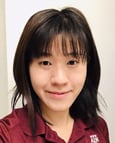 Yi-Fan Li is a second-year doctoral student at Texas A&M University. She got her bachelor’s and master’s in Taiwan with a major in Special Education. She was also a special education teacher for five years, mainly teaching students with intellectual disabilities in a high school. During her teaching career, she had an experience of being a transition coordinator. This valuable experience led her to keep exploring the transition education for individuals with disabilities. Her doctoral journey in Special Education mainly focuses on postsecondary education for individuals with disabilities with her adviser, Dr. Dalun Zhang. Her research focus also brought her a great opportunity of being an instructor in a postsecondary education program. Her hobbies are driving and cooking although she is at a beginner level of the two skills. Right now, she has a small family with her husband and a lovely cat. Texas is their second home. Image Description: The image is the picture of a person and cut off at her chest. She is looking straight at the camera, and smiling slightly. She wears a red polo shirt. The words on the polo short show PATHS program, Texas A&M University with a Texas A&M logo. Her hair length is at her shoulder with cute bangs on her forehead
Yi-Fan Li is a second-year doctoral student at Texas A&M University. She got her bachelor’s and master’s in Taiwan with a major in Special Education. She was also a special education teacher for five years, mainly teaching students with intellectual disabilities in a high school. During her teaching career, she had an experience of being a transition coordinator. This valuable experience led her to keep exploring the transition education for individuals with disabilities. Her doctoral journey in Special Education mainly focuses on postsecondary education for individuals with disabilities with her adviser, Dr. Dalun Zhang. Her research focus also brought her a great opportunity of being an instructor in a postsecondary education program. Her hobbies are driving and cooking although she is at a beginner level of the two skills. Right now, she has a small family with her husband and a lovely cat. Texas is their second home. Image Description: The image is the picture of a person and cut off at her chest. She is looking straight at the camera, and smiling slightly. She wears a red polo shirt. The words on the polo short show PATHS program, Texas A&M University with a Texas A&M logo. Her hair length is at her shoulder with cute bangs on her forehead
1. How does the work you do center disabled people/people with disabilities?
Yi-Fan is an instructor in Postsecondary Access and Training in Human Services (PATHS) program. This program prepares students with disabilities for jobs as Direct Support Professionals and Child Care Professionals in community settings. Students in PATHS programs have different learning styles and need academic adjustments (accommodations) due to their disabilities. Considering the uniqueness in each student, Yi-Fan tries to apply the teaching practices from universal design for learning to make the learning environment accessible and inclusive for all students. Students can benefit from a lecture demonstrated in different formats, and they can choose different ways to express what they have learned. For example, some students prefer to use words or sentences to present their ideas while others prefer to use graphs, figures or pictures. Yi-Fan also likes to create a warm and positive climate in classrooms.
2. How has your AUCD traineeship made you a better ally or self-advocate?
Receiving AUCD traineeship is a brand-new experience for Yi-Fan. She has the opportunity to see how to promote independent living for students with disabilities through educational opportunities in postsecondary education (PSE). During her AUCD traineeship, her advisor and supervisor have encouraged her to explore research interests and to apply her professional knowledge when teaching PSE students. Because of her passion for teaching, she actively expressed willingness to design the curriculum by incorporating the principles of universal design. At the same time, she has worked with other colleagues and learned to practice self-advocacy by stating her professional judgement. She has also received different opinions on her teaching styles and some of the practices she has applied in classrooms. This collaboration has polished her soft skills, such as communication skills, and helped her learn to be a good ally in the team.
3. What is one thing about your own ally ship or self-advocacy that you would like to improve, whether for your disability or other communities?
Currently, as an instructor in PATHS program, Yi-Fan still needs to advance her knowledge and skills to help young adults who are transitioning from PSE to work. Thus, the first goal she would like to improve is to join more regional and nationwide conferences. In conferences, she can explore how other PSE programs support young adults with disabilities through multiple services. The second goal is to explore networking opportunities. Networking is a new and exciting thing for Yi-Fan. Through many networking opportunities, she expects to talk to other professionals about transition education in PSE. She also expects to share the strategies that she has used to support PSE participants. In doing so, she hopes she can build up her confidence and practice self-advocacy skills.
4. What is one obstacle or barrier (local, systemic, and/or policy) that you are addressing in your discipline in partnership with disabled people/people with disabilities?
Yi-Fan is an international student at Texas A&M University. Two challenges for her are to understand local policies and culture. These challenges motivate her to broaden her horizon. During her allyship, she actively joins activities to know about local policies for individuals with disabilities. Partnership with local agencies is a topic she has learned. This partnership is important because transition goals for people with disabilities can be realized through interagency collaboration. The second challenge is to understand the culture; however, this challenge inspires her to interact with different people including PATHS program students. Through engaging with students, she can understand their daily lives and obstacles they are dealing with. In addition, because Yi-Fan is also an individual with a disability (hearing impairment), she shares her disability experiences with people with disabilities. By doing so, students and Yi-Fan can better know each other even though they grew up in different cultures.
Nichole Winges-Yanez
Discipline: Social Work
Texas Center for Disability Studies, UCESS (TX)
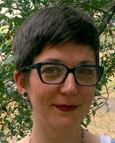 Nick Winges-Yanez, Ph.D., LMSW is an adjunct assistant professor at the Texas Center for Disability Studies (TCDS) through the Steve Hicks School of Social Work at The University of Texas at Austin. She is also a project manager with TCDS, working on the Texas Sibling Network and the Healthy Relationships project. Portland, OR was her home for fifteen years prior to moving to Austin to be closer to her parents and her sister. As a sibling to someone labeled with ID, she is interested in creating a community for other adult siblings. Her main research focus has been on sexuality and intellectual disability, specifically how the two have intertwined throughout history. She is passionate about providing comprehensive sexuality education to those labeled with IDD.
Nick Winges-Yanez, Ph.D., LMSW is an adjunct assistant professor at the Texas Center for Disability Studies (TCDS) through the Steve Hicks School of Social Work at The University of Texas at Austin. She is also a project manager with TCDS, working on the Texas Sibling Network and the Healthy Relationships project. Portland, OR was her home for fifteen years prior to moving to Austin to be closer to her parents and her sister. As a sibling to someone labeled with ID, she is interested in creating a community for other adult siblings. Her main research focus has been on sexuality and intellectual disability, specifically how the two have intertwined throughout history. She is passionate about providing comprehensive sexuality education to those labeled with IDD.
Image Description: A photo of Nick standing in front of a tree outside on a cloudy day. The image is from just below her shoulders and up. She has very short brown hair, wears blue square framed glasses and a light blue linen collarless shirt. She is smiling with her mouth closed and has dark pink lipstick.
1. How does the work you do center disabled people/people with disabilities?
Nick’s main research focus has been sexuality and IDD. She currently teaches a Healthy Relationships class at the postsecondary level for adults labeled with IDD attending certificate programs and is working in partnership to adapt a comprehensive sexuality education curriculum for K-12 students labeled with IDD. Her other project is working with adult siblings of people labeled with IDD, creating a community of support, education, and advocacy in Texas.
2. How has your AUCD traineeship made you a better ally or self-advocate?
Since working at TCDS, Nick is much more knowledgeable of services and supports available to families and self-advocates in Texas. Her colleagues provide daily learning opportunities within the academic and non-academic communities.
3. What is one thing about your own ally ship or self-advocacy that you would like to improve, whether for your disability or other communities?
Since moving to Texas just over three years ago, Nick has learned much about services and supports available. She is interested in improving her knowledge about these complicated systems so she can be a better ally. She is also interested in becoming active during the legislative session to create a more inclusive community.
4. What is one obstacle or barrier (local, systemic, and/or policy) that you are addressing in your discipline in partnership with disabled people/people with disabilities?
Nick is working to adapt a K-12 sexuality education curriculum for students with disabilities who are often left out of this discussion, especially in Texas. She is working on adapting an existing curriculum and self-advocates will peer review the adaptation. She also works with a local organization to provide accurate sexual health education to 18+ transition programs.
Moshe Levi
Discipline: Family, Person with a Disability
Virginia Commonwealth University LEND (VA)
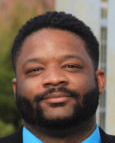 Moshe Levi is the Chief Operating Officer for Creative Approach Development Center. His role at Creative Approach is overseeing daily operations as well as designing and coordinating events and workshops. These events and workshops are designed regarding topics pertinent to the disability community. Moshe believes that patience, hard work, and determination can help individuals overcome many challenges. Diagnosed at grade school with a learning disability himself, Moshe knows the stress, frustrations and even disappointments faced with challenges related to finding and securing resources and opportunities. With this experience, Moshe has dedicated his life to ensure that others with similar challenges have greater opportunities today than there was yesterday. Moshe Levi has worked as a rehabilitative nurse for seven years. He is also an AmeriCorps Alum with experience working with children from many diverse backgrounds and needs. Moshe is a licensed practical nurse (LPN), has a Bachelor’s degree in Applied Behavioral Science and a Master’s degree in Business Administration. He has led and trained countless audiences regarding diversity training, creating inclusive environments and helping to create better communication between individuals.
Moshe Levi is the Chief Operating Officer for Creative Approach Development Center. His role at Creative Approach is overseeing daily operations as well as designing and coordinating events and workshops. These events and workshops are designed regarding topics pertinent to the disability community. Moshe believes that patience, hard work, and determination can help individuals overcome many challenges. Diagnosed at grade school with a learning disability himself, Moshe knows the stress, frustrations and even disappointments faced with challenges related to finding and securing resources and opportunities. With this experience, Moshe has dedicated his life to ensure that others with similar challenges have greater opportunities today than there was yesterday. Moshe Levi has worked as a rehabilitative nurse for seven years. He is also an AmeriCorps Alum with experience working with children from many diverse backgrounds and needs. Moshe is a licensed practical nurse (LPN), has a Bachelor’s degree in Applied Behavioral Science and a Master’s degree in Business Administration. He has led and trained countless audiences regarding diversity training, creating inclusive environments and helping to create better communication between individuals.
Image Description: Moshe is a 6 foot 250lbs black man with black curly hair, a beard, brown eyes, and a semi-athletic build. He is wearing a black blazer with a light-blue button shirt to compliment CADC’s colors and a black tie.
1. How does the work you do center disabled people/people with disabilities?
Moshe dedicates his work to educate individuals with disabilities, families and community members to learn more about various forms of disabilities as well as how the community can come together to create a truly inclusive environment for all abilities. With the goal of empowering individuals with disabilities and their community with knowledge, he hopes to reduce the fear, frustrations, and shame in others that he had in his childhood. He is currently working on a project to demonstrate the risk of late diagnoses and interventions in the minority community.
2. How has your AUCD traineeship made you a better ally or self-advocate?
AUCD has opened the door to so many fresh new perspectives regarding both community views about disability as well as the individual. From understanding the perspectives of both person 1st and identity 1st language to the huge gap between mental health and disabilities, Moshe has become more of an advocate of ensuring that all with disabilities are treated in a matter of respect and dignity based on their own needs and expectations.
3. What is one thing about your own ally ship or self-advocacy that you would like to improve, whether for your disability or other communities?
Moshe would like to improve understanding of recognizing mental health and well being of those with disabilities. He would like to see families and professionals such as parents, siblings, teachers, caseworkers, medical teams, etc. to be more aware of how their roles may contribute to poor mental health in those with disabilities. From using the proper language to treating those with disabilities as an intricate part of society, Moshe hopes that the stigma of people with disabilities not having aspirations of having a sense of belonging and having their own identity will change.
4. What is one obstacle or barrier (local, systemic, and/or policy) that you are addressing in your discipline in partnership with disabled people/people with disabilities?
A common concern that Moshe encounters is that low-income families, as well as minorities, are not receiving adequate assistance. In many cases, an individual demonstrates signs of a disability, but it is not diagnosed or assessed. Thus, this population ends up being dismissed as simply having behavioral challenges. Moshe would like to address this trend in hopes to reduce maladaptive behaviors, academic discipline and ultimately criminal punishment.
Winifred M. Anthony-Todman
Discipline: Social Work
Interdisciplinary Leadership Education Program for Health Professionals, LEND (VI)
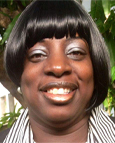 Winifred Anthony-Todman, Virgin Islander and VT LEND fellow, believes the greatest gift one can give is self, and the greatest profession is one of service. Mrs. Anthony-Todman holds a Master of Arts Degree in Counseling and Guidance, a Bachelor of Arts Degree in Social Work, and a Certificate of Completion in Paralegal Studies, all from the University of the Virgin Islands. She is the Director of Support Services for the US Virgin Islands Department of Education. She has received numerous awards and commendations for her outstanding community work having held leadership positions in ten local and national organizations, simultaneously.
Winifred Anthony-Todman, Virgin Islander and VT LEND fellow, believes the greatest gift one can give is self, and the greatest profession is one of service. Mrs. Anthony-Todman holds a Master of Arts Degree in Counseling and Guidance, a Bachelor of Arts Degree in Social Work, and a Certificate of Completion in Paralegal Studies, all from the University of the Virgin Islands. She is the Director of Support Services for the US Virgin Islands Department of Education. She has received numerous awards and commendations for her outstanding community work having held leadership positions in ten local and national organizations, simultaneously.
Image Description: Headshot of a smiling woman professionally dressed.
1. How does the work you do center disabled people/people with disabilities?
Mrs. Anthony-Todman addresses educational disparities in minorities with disabilities in her community through collaborative efforts with private, public, and governmental agencies. She works to educate students, parents, teachers about acceptance and inclusion of persons with disabilities. She advocates on behalf of refugee children with disabilities within the educational system and community and strives to reduce stigma associated with being a refugee.
2. How has your AUCD traineeship made you a better ally or self-advocate?
The VT LEND program, has made it possible for her to be an effective coach, mentor, and advocate for the disabled. As a result of the lessons learned and the experiences shared, she is more aware of the effects ethnic, racial, socio-economic status, cultural experiences, beliefs, and views can impact the quality of health and medical care one receives. Understanding more about how societal views on disability create barriers has increased her efforts to ensure staff, students and community members rethink how they understand disability.
3. What is one thing about your own ally ship or self-advocacy that you would like to improve, whether for your disability or other communities?
As a result of stigma, discrimination, and isolation, many families have a difficult time receiving the assistance they need to ensure that their children become productive and contributing members of their community. Because of these issues and more, many students with disabilities are deprived of educational and professional opportunities that non-disabled students are afforded. For this reason, it she focuses her attention on actively acquiring additional skills needed to change people’s attitudes to see people with disabilities as equal members of the community with contributions to make. This will make it easier for families and individuals with disabilities to make their voices heard.
4. What is one obstacle or barrier (local, systemic, and/or policy) that you are addressing in your discipline in partnership with disabled people/people with disabilities?
As a US Virgin Islands Department of Health and Human Services Caregivers’ Support Group facilitatory, Mrs. Anthony-Todman facilitates a weekly group for parents of disabled children. She educates families and the community about the effects stigmatizing attitudes, inadequate services, as well as exclusion from informal social networks have on the quality of life of persons with disabilities. These societal barriers are addressed as she encourages family-to-family support and self-advocacy within the group. She also works with policymakers in education, human services and the broader community to design and implement services that are accessible, flexible, culturally and linguistically respectful and responsive, and based on individual and family-identified needs of individuals with disabilities.
Winifred M. Anthony-Todman
Discipline: Social Work
Interdisciplinary Leadership Education Program for Health Professionals, LEND (VT)
 Winifred Anthony-Todman, Virgin Islander and VT LEND fellow, believes the greatest gift one can give is self, and the greatest profession is one of service. Mrs. Anthony-Todman holds a Master of Arts Degree in Counseling and Guidance, a Bachelor of Arts Degree in Social Work, and a Certificate of Completion in Paralegal Studies, all from the University of the Virgin Islands. She is the Director of Support Services for the US Virgin Islands Department of Education. She has received numerous awards and commendations for her outstanding community work having held leadership positions in ten local and national organizations, simultaneously.
Winifred Anthony-Todman, Virgin Islander and VT LEND fellow, believes the greatest gift one can give is self, and the greatest profession is one of service. Mrs. Anthony-Todman holds a Master of Arts Degree in Counseling and Guidance, a Bachelor of Arts Degree in Social Work, and a Certificate of Completion in Paralegal Studies, all from the University of the Virgin Islands. She is the Director of Support Services for the US Virgin Islands Department of Education. She has received numerous awards and commendations for her outstanding community work having held leadership positions in ten local and national organizations, simultaneously.
Image Description: Headshot of a smiling woman professionally dressed.
1. How does the work you do center disabled people/people with disabilities?
Mrs. Anthony-Todman addresses educational disparities in minorities with disabilities in her community through collaborative efforts with private, public, and governmental agencies. She works to educate students, parents, teachers about acceptance and inclusion of persons with disabilities. She advocates on behalf of refugee children with disabilities within the educational system and community and strives to reduce stigma associated with being a refugee.
2. How has your AUCD traineeship made you a better ally or self-advocate?
The VT LEND program, has made it possible for her to be an effective coach, mentor, and advocate for the disabled. As a result of the lessons learned and the experiences shared, she is more aware of the effects ethnic, racial, socio-economic status, cultural experiences, beliefs, and views can impact the quality of health and medical care one receives. Understanding more about how societal views on disability create barriers has increased her efforts to ensure staff, students and community members rethink how they understand disability.
3. What is one thing about your own ally ship or self-advocacy that you would like to improve, whether for your disability or other communities?
As a result of stigma, discrimination, and isolation, many families have a difficult time receiving the assistance they need to ensure that their children become productive and contributing members of their community. Because of these issues and more, many students with disabilities are deprived of educational and professional opportunities that non-disabled students are afforded. For this reason, it she focuses her attention on actively acquiring additional skills needed to change people’s attitudes to see people with disabilities as equal members of the community with contributions to make. This will make it easier for families and individuals with disabilities to make their voices heard.
4. What is one obstacle or barrier (local, systemic, and/or policy) that you are addressing in your discipline in partnership with disabled people/people with disabilities?
As a US Virgin Islands Department of Health and Human Services Caregivers’ Support Group facilitatory, Mrs. Anthony-Todman facilitates a weekly group for parents of disabled children. She educates families and the community about the effects stigmatizing attitudes, inadequate services, as well as exclusion from informal social networks have on the quality of life of persons with disabilities. These societal barriers are addressed as she encourages family-to-family support and self-advocacy within the group. She also works with policymakers in education, human services and the broader community to design and implement services that are accessible, flexible, culturally and linguistically respectful and responsive, and based on individual and family-identified needs of individuals with disabilities.
John Lemus
Discipline: Self Advocacy Trainee
Center on Human Development & Disabilities (WA)
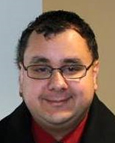 John Lemus Is a Self Advocate LEND Trainee at the University of Washington LEND. John has worked in the Developmental Disabilities movement for 15 years from 2004 to current. Over the past 15 years he has held several leadership positions within the WA State I/DD movement. John was recognized with the 2015 Tom Miller award for advocacy from Source America. John Worked for SKILS’KIN for 4 years and now is working his dream job as an Activist/Advocate for AtWork! Through this position John gets to work with Federal State and Local elected leaders on disabilities policy. John also served from 2005-2014 on the Washington State DD Council while on the council John held several leadership positions including Vice Chair while the council was without an appointed chair. John is a skilled community organizer and worked as an organizer on the Lisa Brown For Congress Campaign.
John Lemus Is a Self Advocate LEND Trainee at the University of Washington LEND. John has worked in the Developmental Disabilities movement for 15 years from 2004 to current. Over the past 15 years he has held several leadership positions within the WA State I/DD movement. John was recognized with the 2015 Tom Miller award for advocacy from Source America. John Worked for SKILS’KIN for 4 years and now is working his dream job as an Activist/Advocate for AtWork! Through this position John gets to work with Federal State and Local elected leaders on disabilities policy. John also served from 2005-2014 on the Washington State DD Council while on the council John held several leadership positions including Vice Chair while the council was without an appointed chair. John is a skilled community organizer and worked as an organizer on the Lisa Brown For Congress Campaign.
Image Description: Picture of person standing behind a white wall. They are looking directly into the camera and smiling. Their har is brown. They are wearing black glasses a red shirt crosshatched tie and a black peacoat.
1. How does the work you do center disabled people/people with disabilities?
As a self advocate all the work that he does centers around people with disabilities. He has chosen policy as their special interest. He works with people with I/DD to address policies and systems change to help better serve those with disabilities. He believes that people with disabilities are the most under represented voices in government and works are to bring their voices to the forefront of policy discussions. He believes that nothing about us without us is the way to go!
2. How has your AUCD traineeship made you a better ally or self-advocate?
John never got to go to college, so he has been “geeking out” at the academic side of the LEND program. The LEND is made up of so many different disciplines and having the opportunity to not only learn from these individuals but to inform their work with a self-advocate perspective. He believes that through his perspective it will help the future leaders in our field think about the self advocate perspective. He hopes that his work within the LEND will help inform the other disciplines and in turn families and self advocates will see a better continuum of care across the lifespan.
3. What is one thing about your own ally ship or self-advocacy that you would like to improve, whether for your disability or other communities?
As an autistic self advocate John experiences difficultly with communication. There is a lot of passion in my advocacy work and its hard sometimes to not get frustrated especially when others don’t agree around policy. He is currently reading I Think Your Wrong (But I’m Still Listening) by Sarah Stewart Holland and Beth Silvers. The book teaches how to have grace filled political conversations. He hopes by continuing to work on thinking outside of the box that he can continue to work on this area which will make him a better advocate.
4. What is one obstacle or barrier (local, systemic, and/or policy) that you are addressing in your discipline in partnership with disabled people/people with disabilities?
John is currently working on organizing advocates in the state of Washington and the national level to rally around subminimum wage. He sees this as the biggest civil rights abuse that individuals with disabilities face. He has been working on rallying advocates in his local area and state level to rally around ending of 14c. He realizes that now is the best time to push this issue along side other advocates as there are not only bills in the Washington State Legislature but also at the federal level that will be important to get passed.